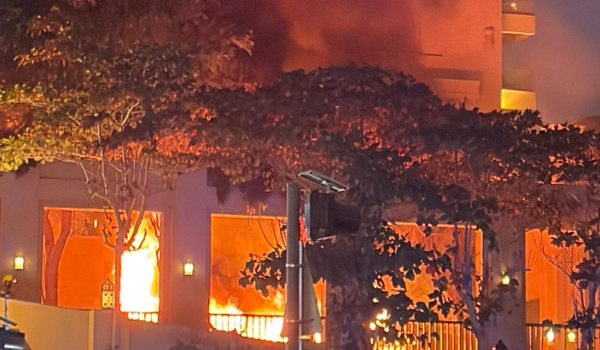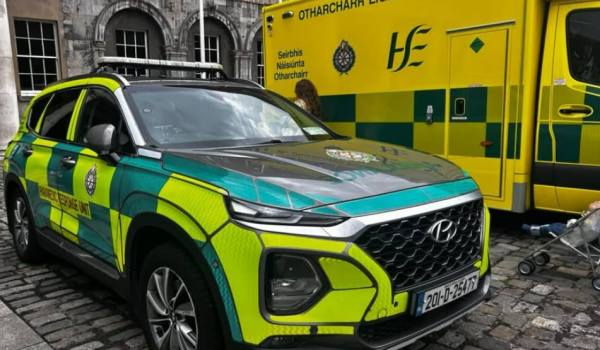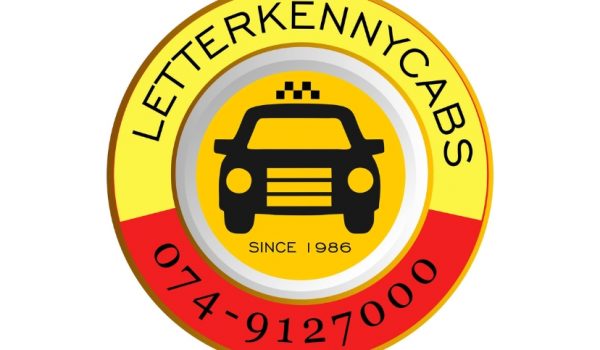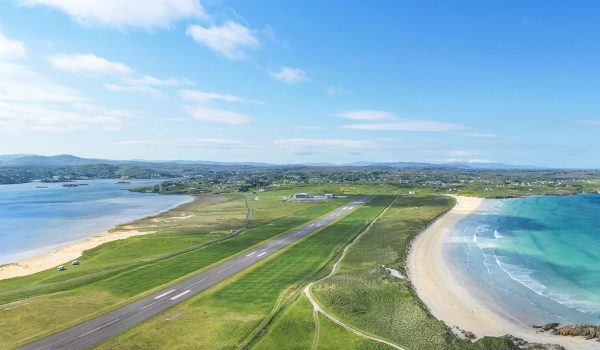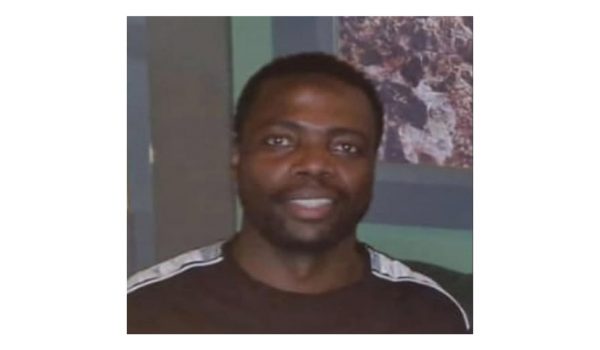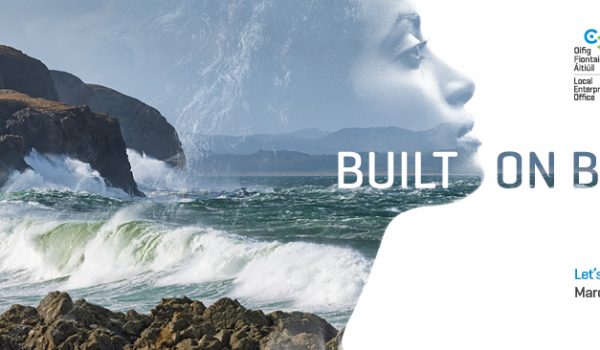4:12pm: Over and out from the 43rd MacGill Summer School
4:06pm: Séan Beattie, editor of the Donegal Annual, speaking in the launch reflected on an article previously written by the Director of the MacGill Summer School, Dr Joe Mullholland in which he commented on how the stormy landscape of Donegal provided a canvas for local writer Patrick MacGill’s work.
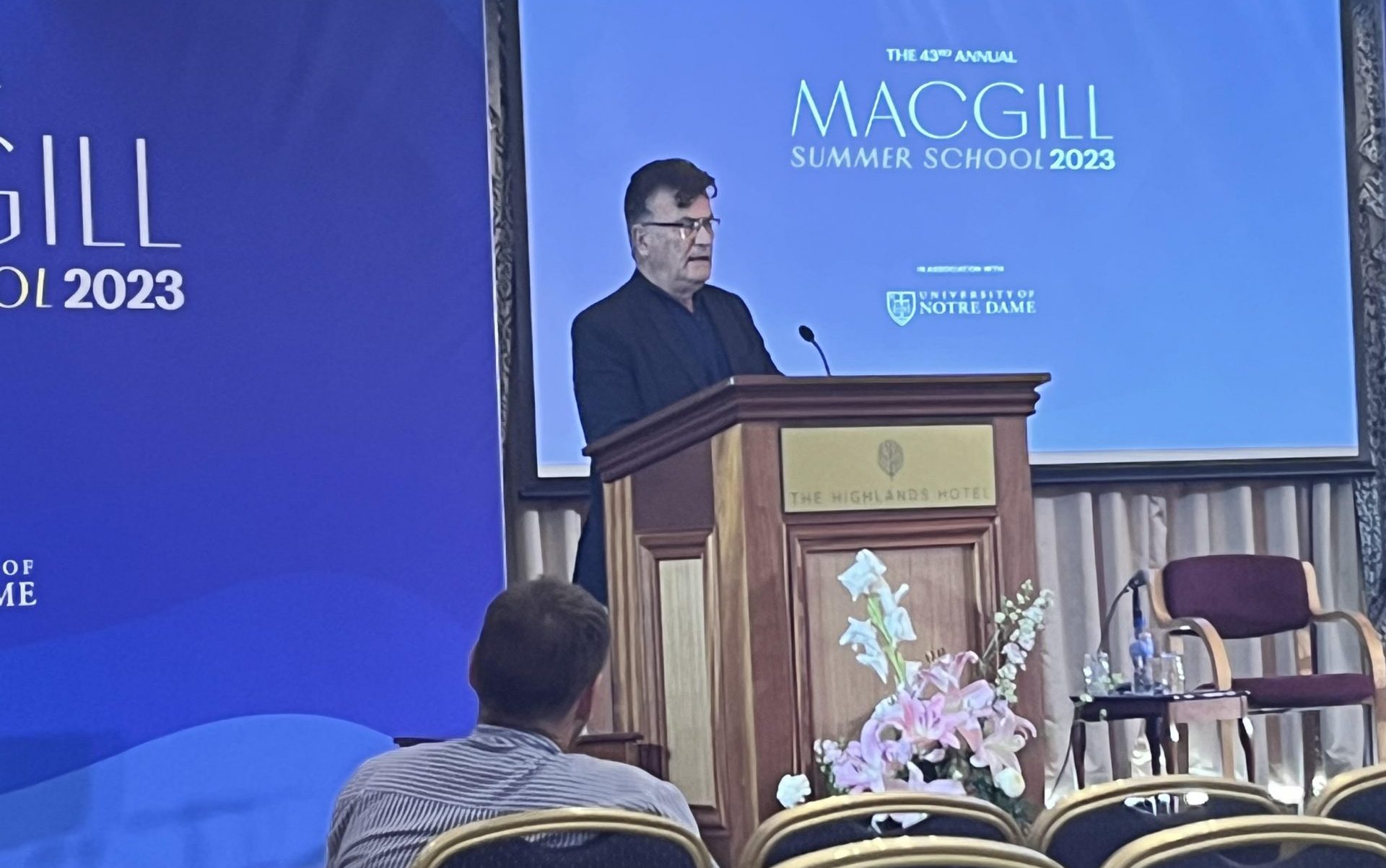
4:01pm: The 2023 Donegal Annual has been launched at the MacGill Summer School.
It is the 75th edition of the annual which was first published by the County Donegal Historical Society in 1947.
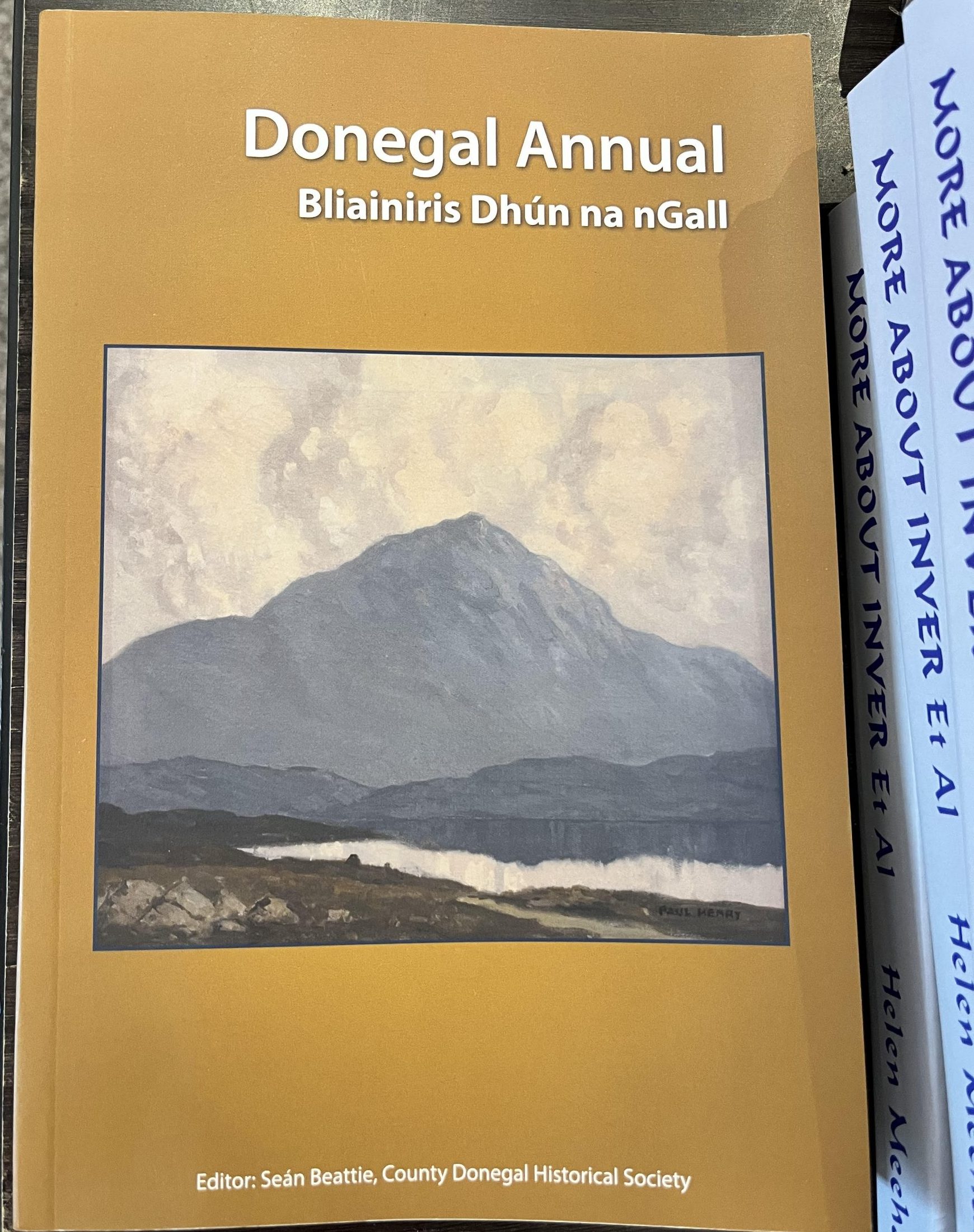
3:42pm: Ruth Sheridan, Industry Analyst Frontline Ventures spoke earlier in the session about her belief that AI will lead to further job creation.
Responding later to concerns over jobs being replaced, she says automating jobs is not a new phenomenon:
3:35pm: Meanwhile, Professor Barry O’Sullivan, Professor of Artificial Intelligence UCC says while there are challenges, AI has many positives:
He’s also allayed fears that robots are not coming to get us!:
3:28pm: Professor Linda Hogan has told the MacGill Summer School that people need to decide what they want in progressing their lives with artificial intelligence:
3:08pm: There are no present formal discussions around the military use of AI.
However, Professor O’Sullivan says drones are currently of great concern due to their significant impact and being very difficult to deal with.
He says the use of drones in the Ukrainian war heightened tensions on both sides but added that they’ve proven beneficial in terms of facial recognition for Ukraine to identify who they were dealing with and the movement of people and forces across the country.
2:58pm: Professor Barry O’Sullivan, Professor of Artificial Intelligence UCC says AI is not new.
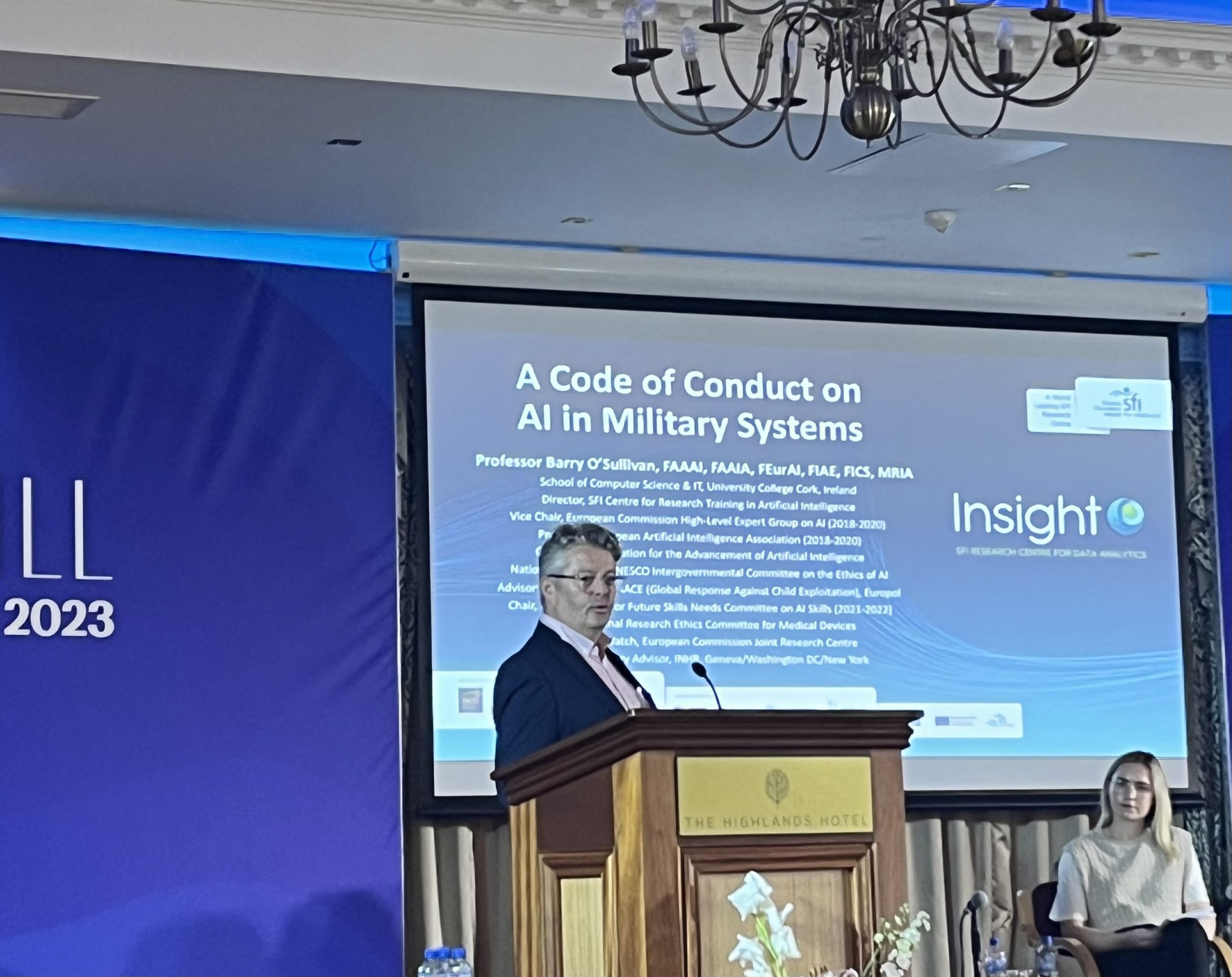
If you have searched for flight or used Sat Nav, you have engaged with artificial intelligence says Professor O’Sullivan.
He says if AI is going to be as transformative as expected then we need to ensure society benefits from the economic benefits of it.
With the tendency to overestimate the impact of technology in the short term and underestimate it in the long term, Professor O’Sullivan says we need to look at AI in the long term.
2:49pm: In considering if there needs to be a global regulator for AI, Professor Linda Hogan says regulation alone won’t address the issues.
2:39pm: There are questions about the upper limit of AI, its development and should there be an upper limit?
The use of AI, as outlined by Professor Hogan poses an ethical risk in a surveillance society with facial recognition having the capacity to make surveillance systems more powerful she believes.
Professor Hogan has outlines that there are concerns also for vulnerable groups such as LGBTQ+ and dissidents.
2:36pm: Moving to who is the master?
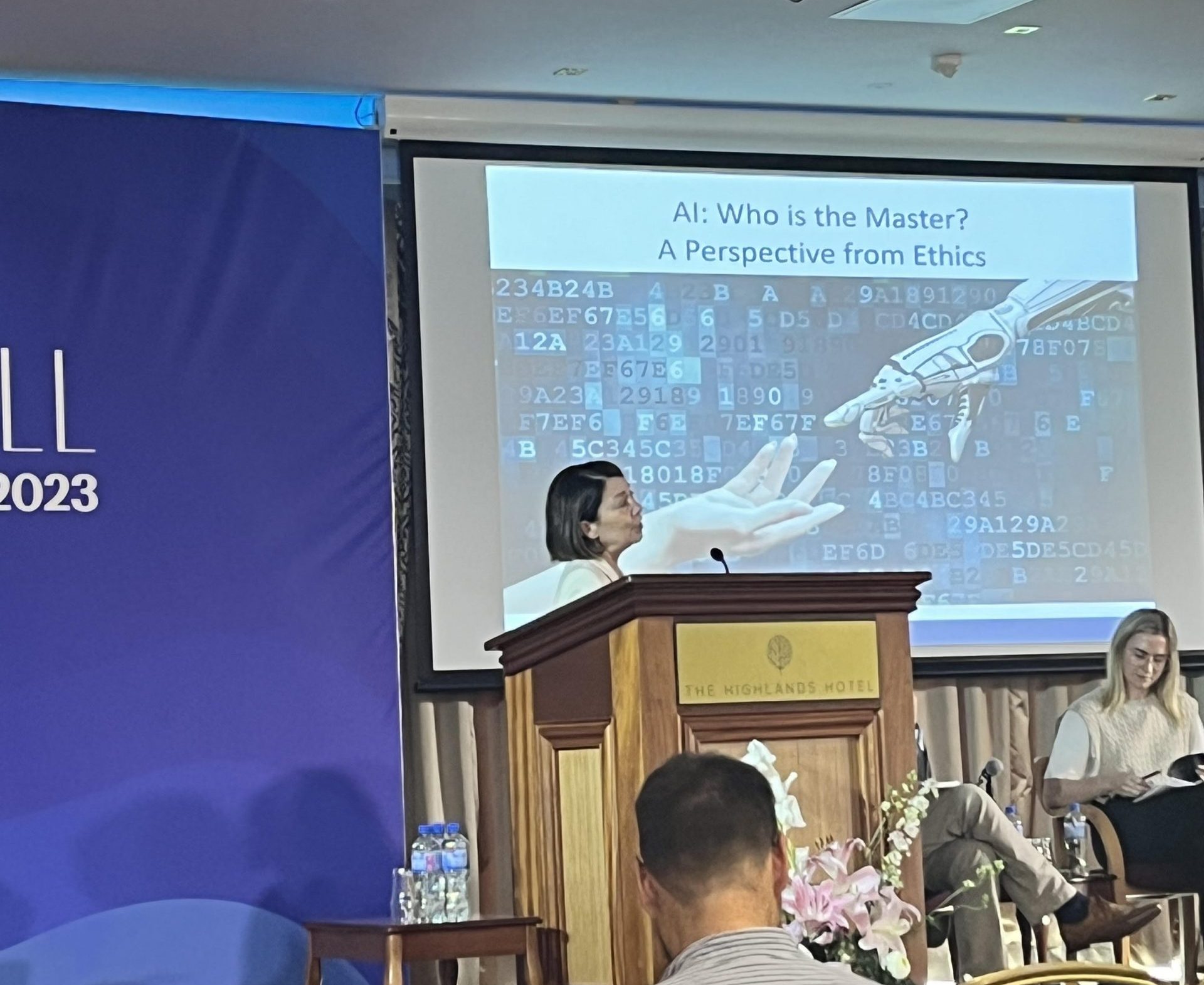
Professor Linda Hogan, Professor of Ecumenics Trinity College Dublin kicks off on how the discussion on ethics and AI has evolved over the past decade.
2:30pm: AI will become a co-pilot for every profession.
That’s according to Ruth Sheridan. She foresees artificial intelligence will see the majority of its value flow direct to the consumer, expects it to weaken Europe’s economic position and believes it will create more jobs.
2:27pm: Ruth Sheridan, Industry Analyst Frontline Ventures says the impact of ChatGPT which she has described as the “AI bomb” as immediate and dramatic.
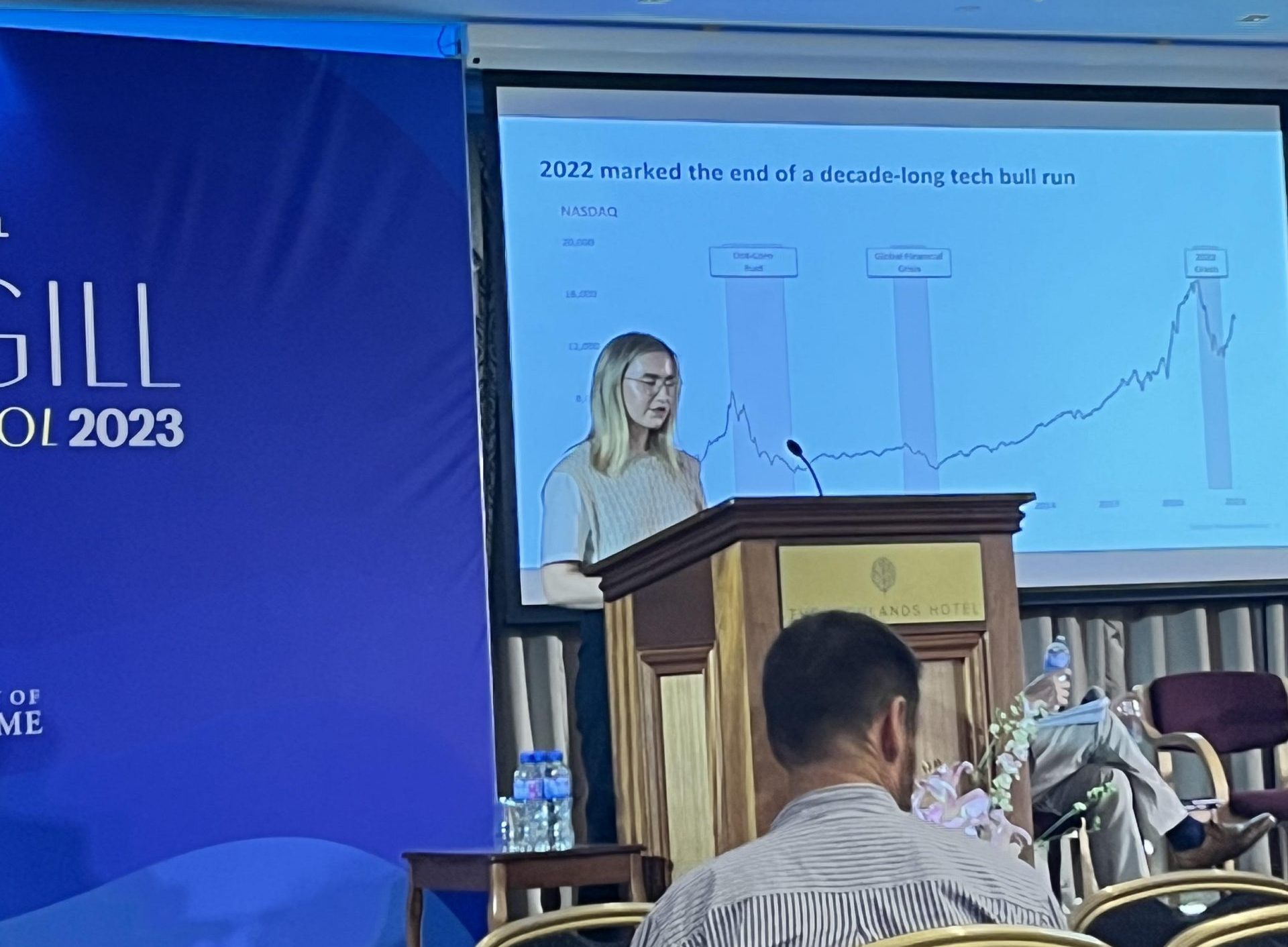
It led to schools struggling to differentiate between student and AI generated work and the Government forced to take steps to curb this new technology emergence.
Ms Sheridan says Chat GPT has created more questions than answers.
2:15pm: AI: Who is the Master?
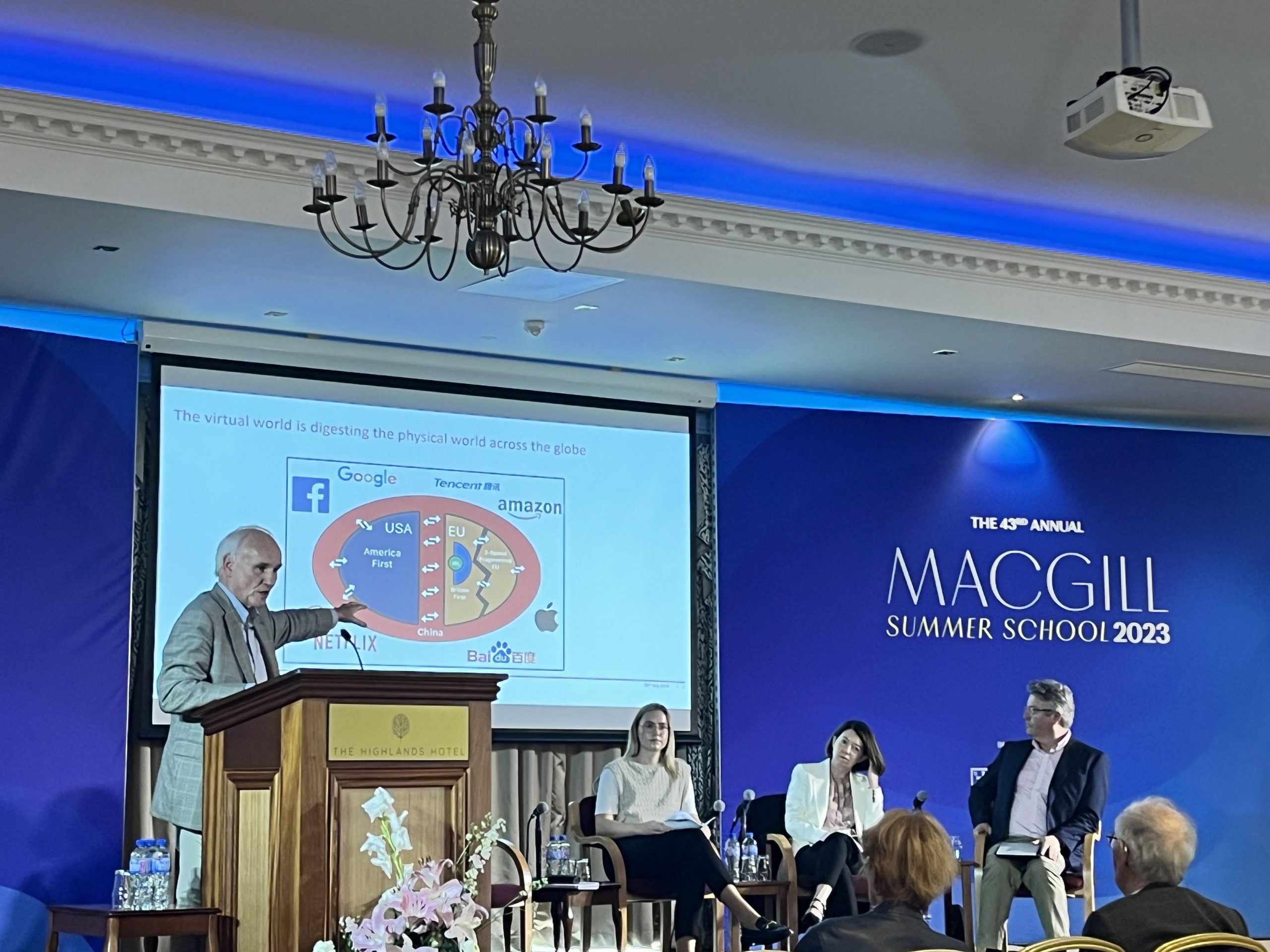
Professor Barry O’Sullivan, Professor of Artificial Intelligence UCC, Ruth Sheridan, Industry Analyst Frontline Ventures and Professor Linda Hogan, Professor of Ecumenics Trinity College Dublin debate what Shay Garvey, Chair of The Irish Times termed “the elephant in the room.”
1:56pm: Scottish Minister for Energy and the Environment, Gillian Martin interview:
12:46pm: When asked by a student from the University of Notre Dame if Scotland and Ireland had any plans to introduce nuclear fusion, Scottish Minister for Energy and the Environment, Gillian Martin says a no nuclear zone has been a long held policy of the SNP.
She views nuclear expensive and dangerous and believes her country has adequate natural resources and doesn’t need nuclear energy.
Meanwhile, Hannah Daly, Professor of Sustainable Energy at University College Cork says she would be in favour of building nuclear energy in Ireland but doesn’t think we have the time to do so.
12:09pm: Could nuclear power impact climate change?
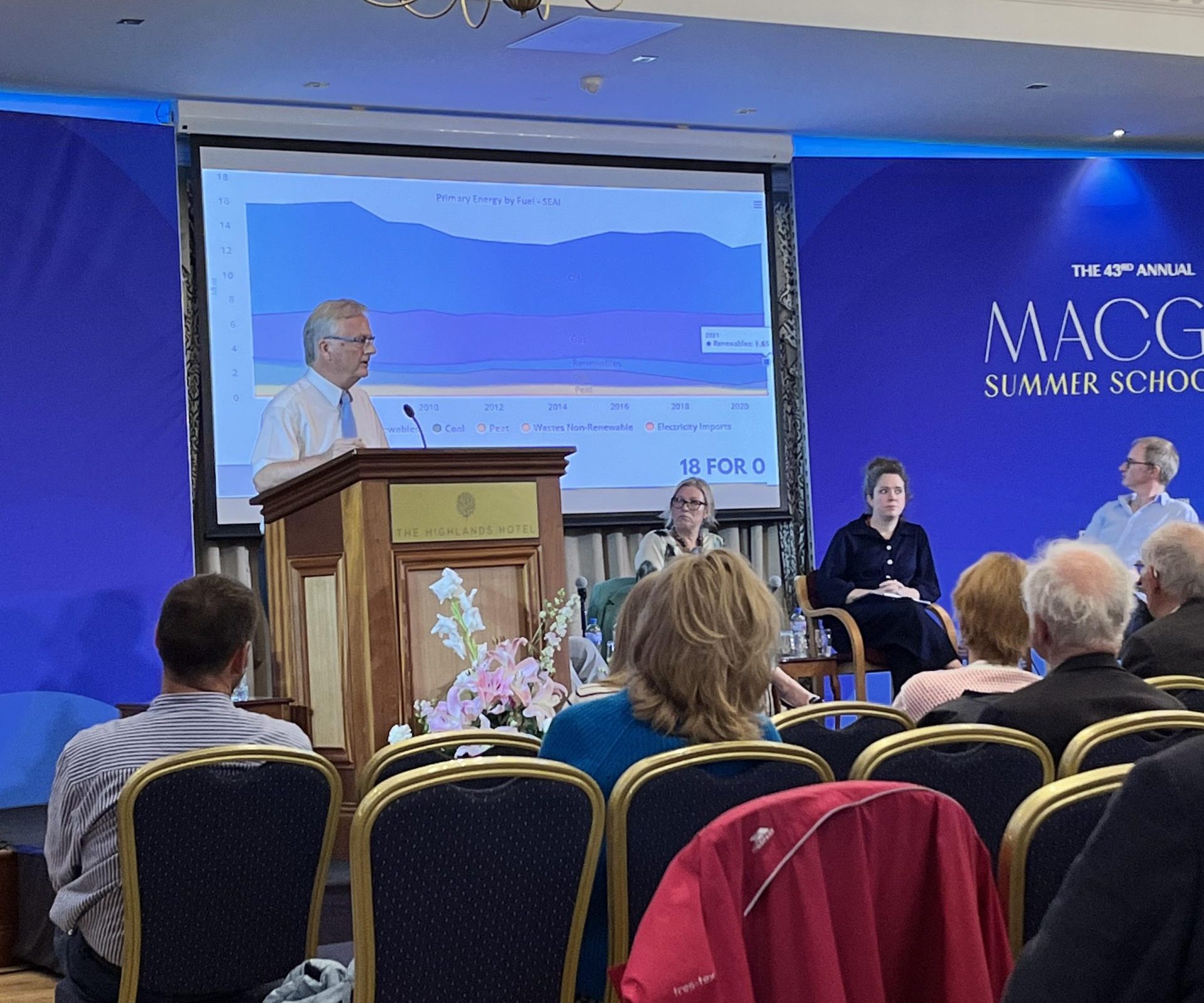
Dr Denis Duff, a chartered engineer with global experience in nuclear is of the opinion that Government must do everything in their power given the gravity of the climate crisis.
A member of the ’18 for 0′ group, Dr Duff says it is near impossible if only renewable energy is being considered as a way forward to reduce emissions.
He doesn’t believe Ireland isn’t doing everything it can to make strides towards combating climate change.
Dr Duff says research suggests nuclear energy has many positives:
12:00pm: “We haven’t really taken up the arms” to attack climate change – Oisin Coughlan, CEO Friends of the Earth
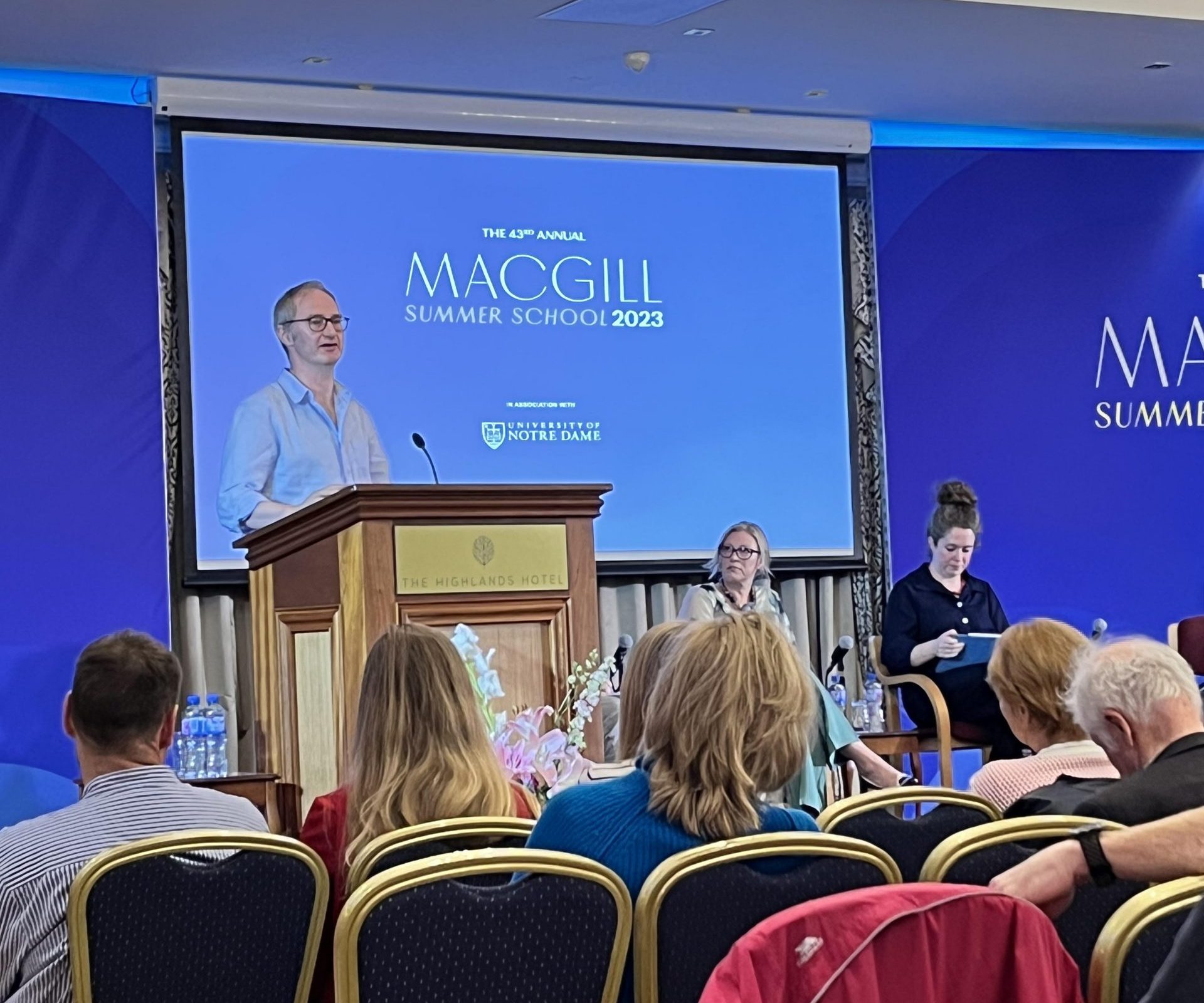
Oisin Coughlan says Ireland hasn’t gone beyond the rhetoric in a meaningful way and people are now witnessing first-hand droughts, fires and floods.
He says Irish people are now realising that climate change is a present danger to human civilisation.
Mr Coughlan believes the pressure must be put on politicians to ensure they act now.
He says the race to zero pollution needs to “be fast enough but fair enough to leave no one behind.”
The CEO of Friends of the Earth questioned the leaders of the main political parties on where they are in the fight against climate change:
11:51am: Hannah Daly, Professor of Sustainable Energy University College Cork says it is very clear Ireland is not taking climate change seriously.
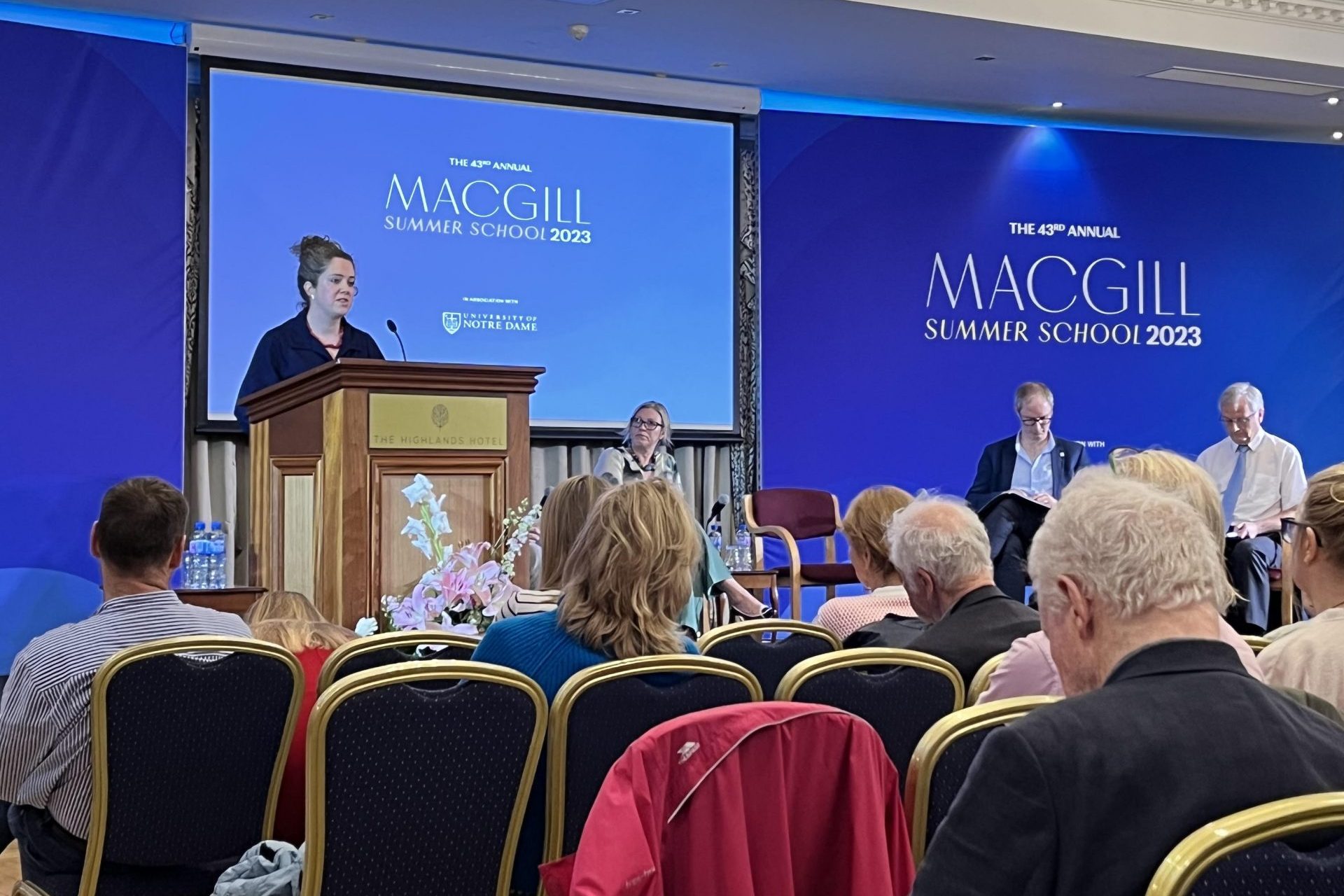
Ms Daly says agriculture tolerance for temperatures relies on a stable climate however, July being the hottest on record this year is evidence that the weather is getting more extreme and unpredictable.
She believes part of the gulf stream will shut down within our generation with the impacts being felt greatly on the island.
There is an opinion that Ireland will be able to cut emissions better in the next generation with the help of technology but the Professor of Sustainable Energy University College Cork has warned that pushing the target forward is making it more difficult to achieve.
Ms Daly ended her address at the MacGill Summer School by cautioning that 2050 is far too late for net zero.
She says we ultimately need to act now with future generations in mind:
11:38am: The Scottish Government is making strides on off shore wind energy and working towards the introduction of hydrogen.
Minister Gillian Martin believes this poses partnership opportunities for Ireland and Scotland.
She added that it is a juggling act to protect environment in efforts to tackle climate change.
Minister Martin says having been in Donegal for 48 hours, every conversation has reflected the view that both countries can learn from each other to achieve their shared ambition.
11:27am: Scotland’s aim is to deliver net zero by 2025, five years ahead of Ireland.
The Scottish Minister for Energy and the Environment says what is more daunting is their interim target to have a 75% reduction in greenhouse gas emissions by 2030.
Scotland’s aim is to create an energy system that deliveries not only an affordable and green energy but a just transition.
11:22am: Minister Gillian Martin opens the debate by speaking about the “deep historical connection between Donegal and Scotland” and the shared ambitions for the future.
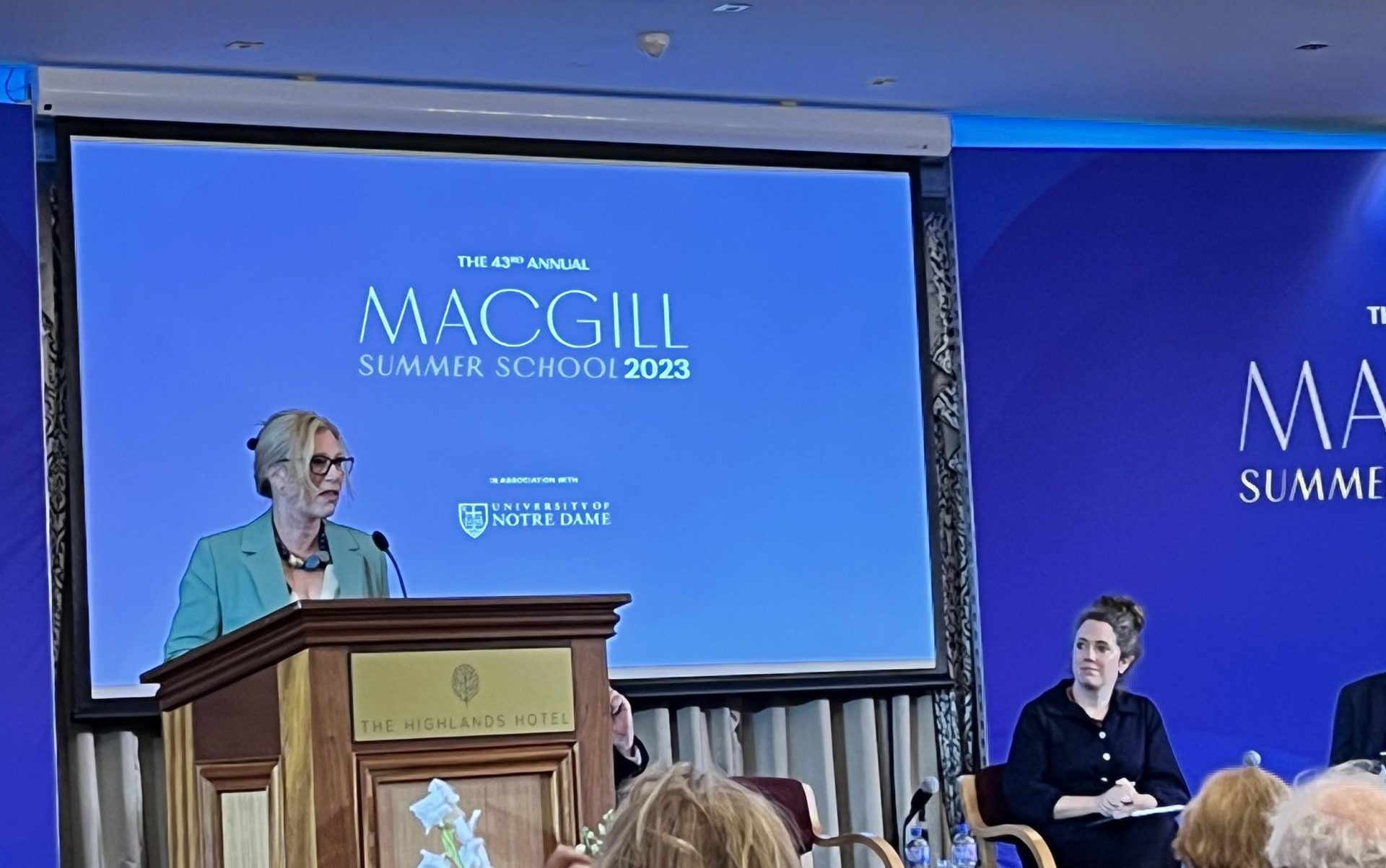
She says there already exists a very strong partnership between Ireland and Scotland but it needs to flourish more.
Minister Martin however, says the challenges posed by climate change are “absolutely daunting.”
11:07am: With the rain teaming down on this August morning, it seems fitting that today’s matters commence with ‘The Planet, including Ireland, is losing the battle against Climate Change?’
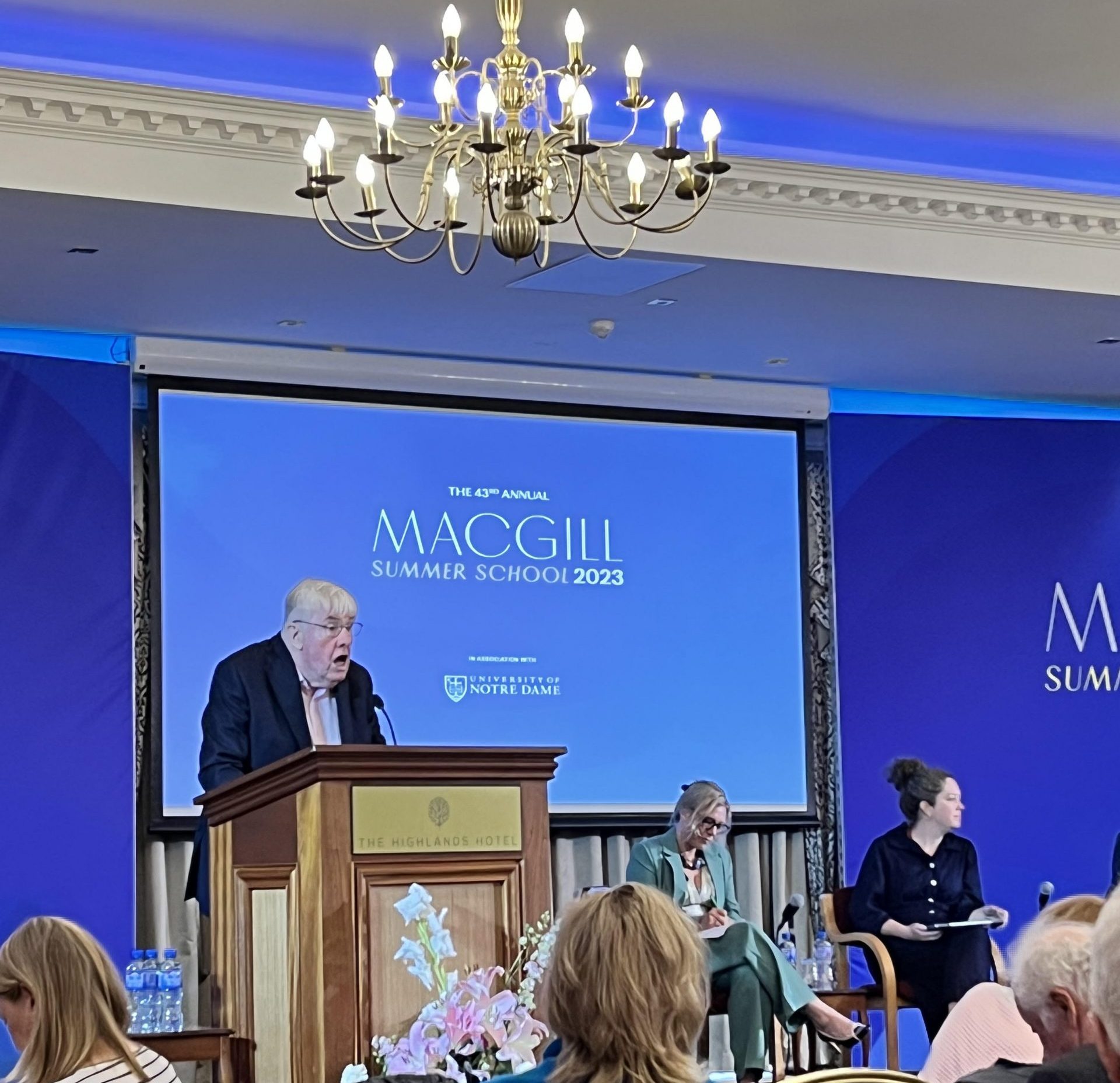
The panel discussion is due to hear comments from; Minister Gillian Martin, MSP, Minister for Energy and the Environment, the Scottish Government, Dr Denis Duff, Chartered engineer, Global experience in nuclear, Hannah Daly, Professor of Sustainable Energy University College Cork, regular columnist for the Irish Times & Government Adviser and Oisin Coughlan, CEO Friends of the Earth.
11:01am: Listen to Orlaith McBride, board member of the Brian Friel Trust speaking in Glenties about plans to open a centre dedicated to the playwright in October 2025 to coincide with the tenth anniversary of his passing:
10:58am: The final day of the MacGill Summer School gets underway shortly in a wet and windy Glenties
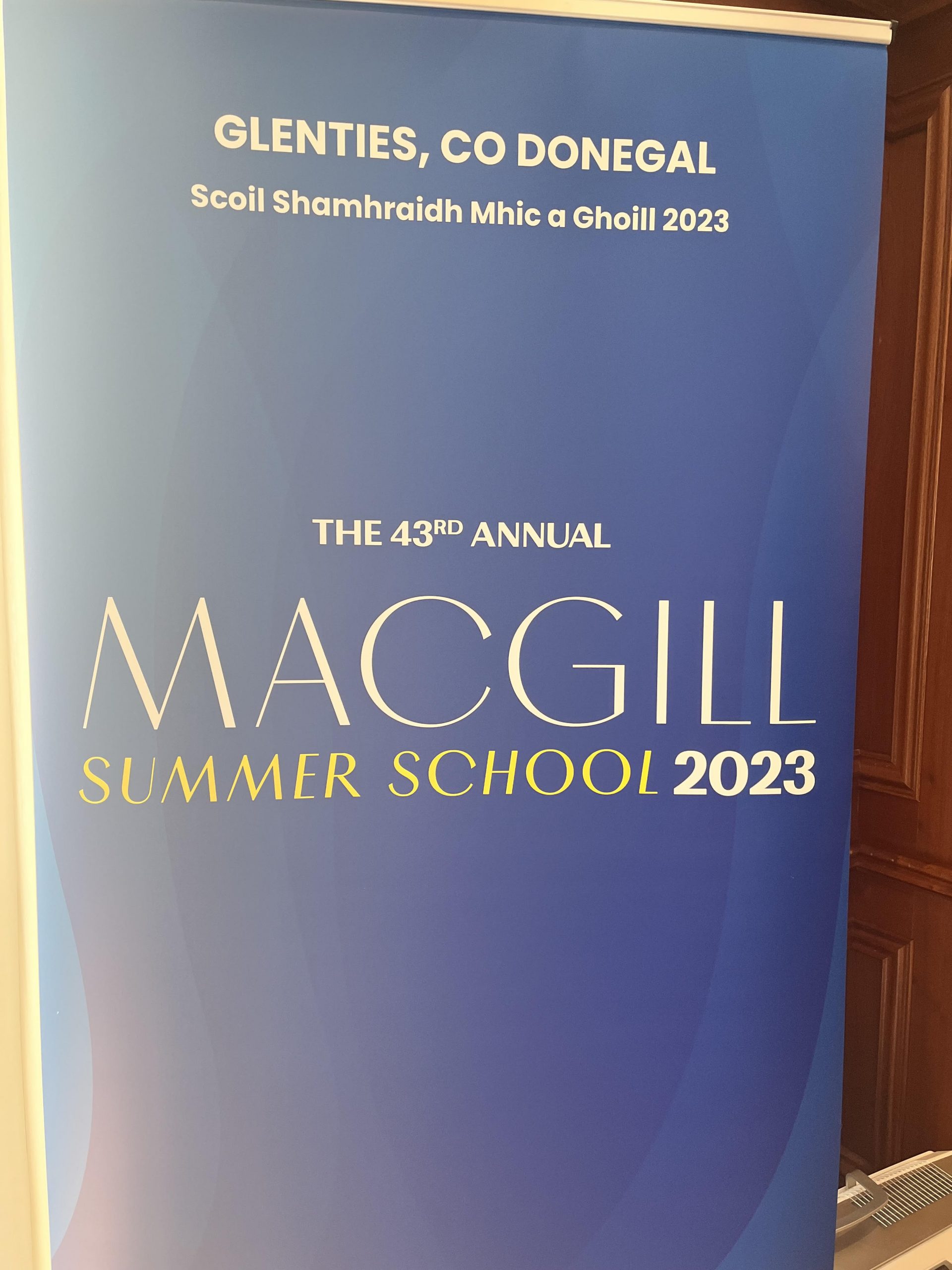
10:25pm: Day three of the MacGill Summer School has drawn to a close after much talk on politics in Ireland and Northern Ireland
10:15pm: Fr Martin McGill who presided over the funeral of journalist Lyra McKee who was shot dead in Derry in 2019 has directed a question to DUP MLA Emma Little-Pengelly asking with collective healing in mind how those who died through the years can be remembered.
Ms Pengelly says we need to go back to the underlying values within society.
9:38pm: The issue of a border poll has been raised at the MacGill Summer School.
Minister Charlie McConalogue and MLA Emma Little-Pengelly doesn’t believe there will be a border poll in the next 10 years while Deputy Rose Conway-Walsh believes there will be and MP Claire Hannah is on the fence on the matter, she says there possibly will be.
Minister McConalogue says the first step needs to be to achieve a shared island and a sharing of services whereas MLA Little-Pengelly believes a border poll, similar to the Brexit vote, forces people to pick a side.
On the other hand, Deputy Conway-Walsh says she wants Ireland to be in charge of “our own affairs.”
MP Hannah says in terms of a border poll, it isn’t a green and orange matter anymore.
9:11pm: Tommie Gorman has put it to Fianna Fail Minister Charlie McConalogue if he would be open to going into Government with Sinn Fein to which he replied; “its too early to discuss that.”
He says the public will ultimately have the say when they cast their vote:
In continuing the discussion, Deputy Rose Conway-Walsh says Sinn Fein wants to be in Government on both sides of the border.
She said her party’s preference is to form a left government with Ireland having been ‘strangled by civil war politics.”
9:05pm: DUP MLA Emma Little-Pengelly says her party wants to see the impasse in Northern Ireland resolved sooner rather than later and believes it is “absolutely doable if there is a political will.”
She says “nobody is asking for perfection.”
Sinn Fein Deputy Rose Conway-Walsh says her party is willing to get the Assembly back up and running.
Meanwhile, when the question was put to Minister Charlie McConalogue if he envisaged a return to institutions in the North he says people “need to learn how to share our island.”
8:59pm: Northern Ireland is in a “frustrating paralysis” according to SDLP MP Claire Hannah
She says there is a growing group that are rejecting politics based on identity and there is too, an increasing band of people that are interested in a new Ireland that want a new Ireland for access to governance.
The SDLP MP says discussions on a new Ireland need to revolve around the “why and how” rather than the “who and when.”
She says reform of the Northern Ireland Assembly is vital to better incentivise politics but it will require a lot more cooperation from Dublin and London.
In the aftermath of Brexit she says there is a sense that London has completely switched off from its stewardship of Northern Ireland.
Ms Hannah is of the belief that there is no way forward without a functioning Government in Northern Ireland:
8:50pm: Taking to the microphone, Sinn Fein Deputy Rose Conway-Walsh says there is no doubt that the Stormont stalemate has harmed North South relations
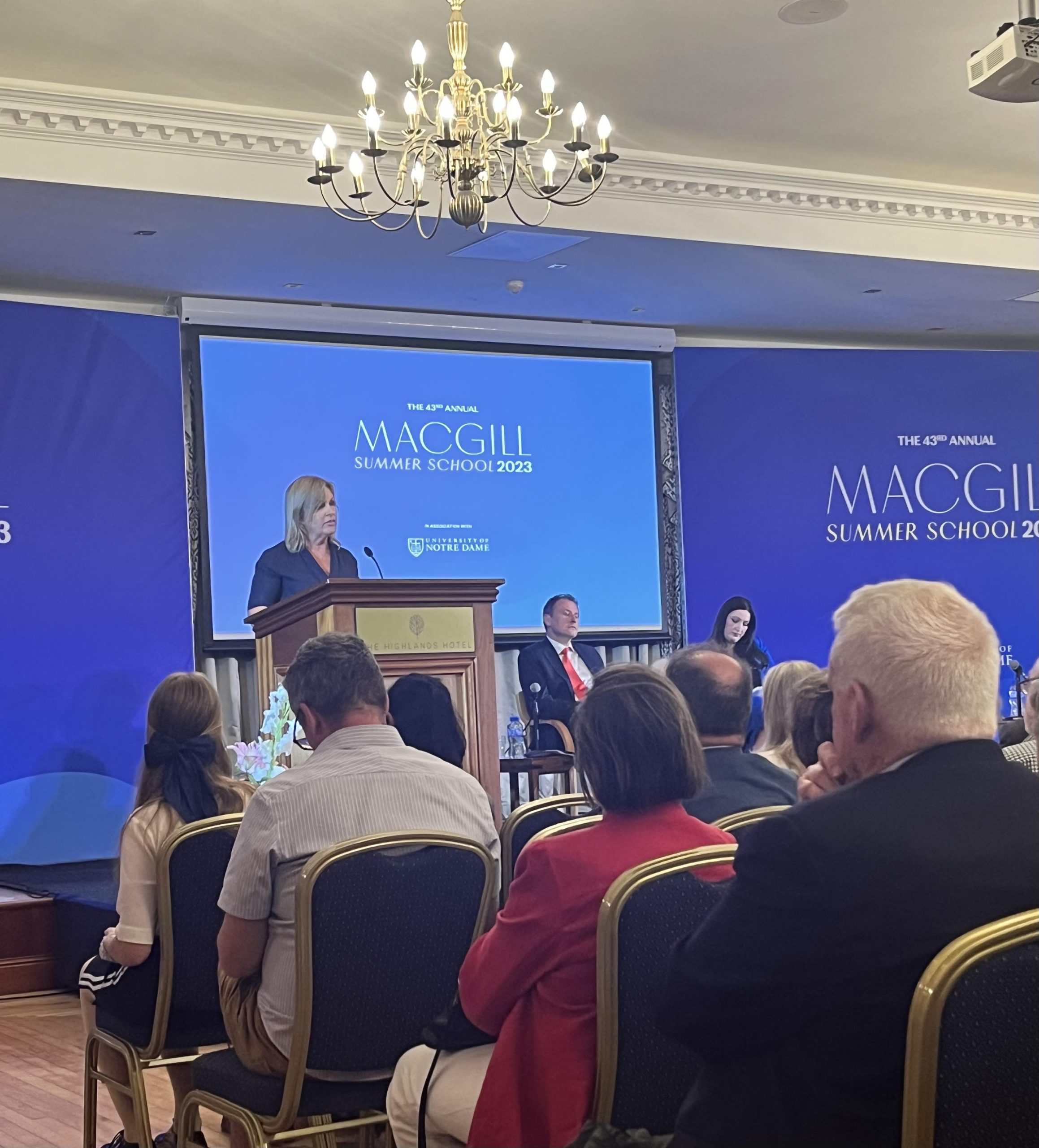
Deputy Rose Conway-Walsh believes attitudes towards a border poll in the North are changing.
She says she is extremely excited about the future of the island.
However, she warned that Governments on both sides of the border need to learn from Brexit.
The call for a citizens assembly to be established to begin discussions on a border poll was repeated.
Deputy Conway-Walsh said we need to “look at what our values are as an island.”
She says Ireland is in a unique position to look at what its values are:
8:40pm: “We all need to stretch a little”
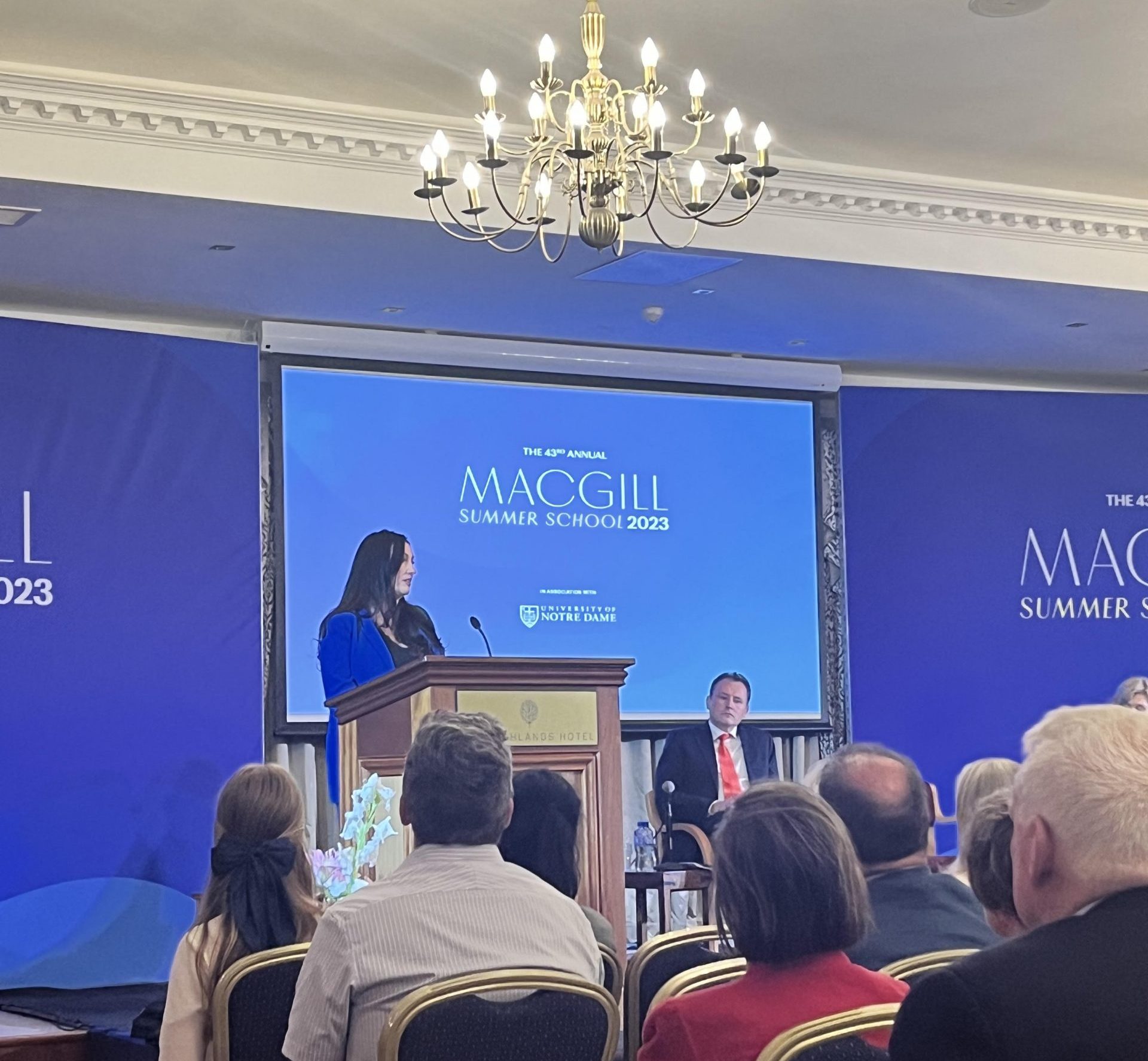
DUP MLA Emma Little-Pengelly, speaking at the MacGill Summer School when acknowledging the ‘fractured’ relationships in Northern Ireland says all parties and communities need to “stretch a little” in a bid to enter a period of “healing”.
The DUP spokesperson for legacy says Northern Ireland’s legacy goes beyond The Troubles and that her party is genuinely working to address issues to ensure a solid foundation to move forward.
Ms Little-Pengelly, in referencing the popular TV drama ‘Blue Lights’ said everyone needs to “take a beat” to consider how we have got to the current place without a functioning Government in Northern Ireland and “how do we move on to get to where we want to be.”
She is hopeful the North can begin repairing the fractures:
8:27pm: Minister Charlie McConalogue has opened his address to the MacGill Summer School by stating that there is still much more to do in the years ahead to get the most out of the Good Friday Agreement
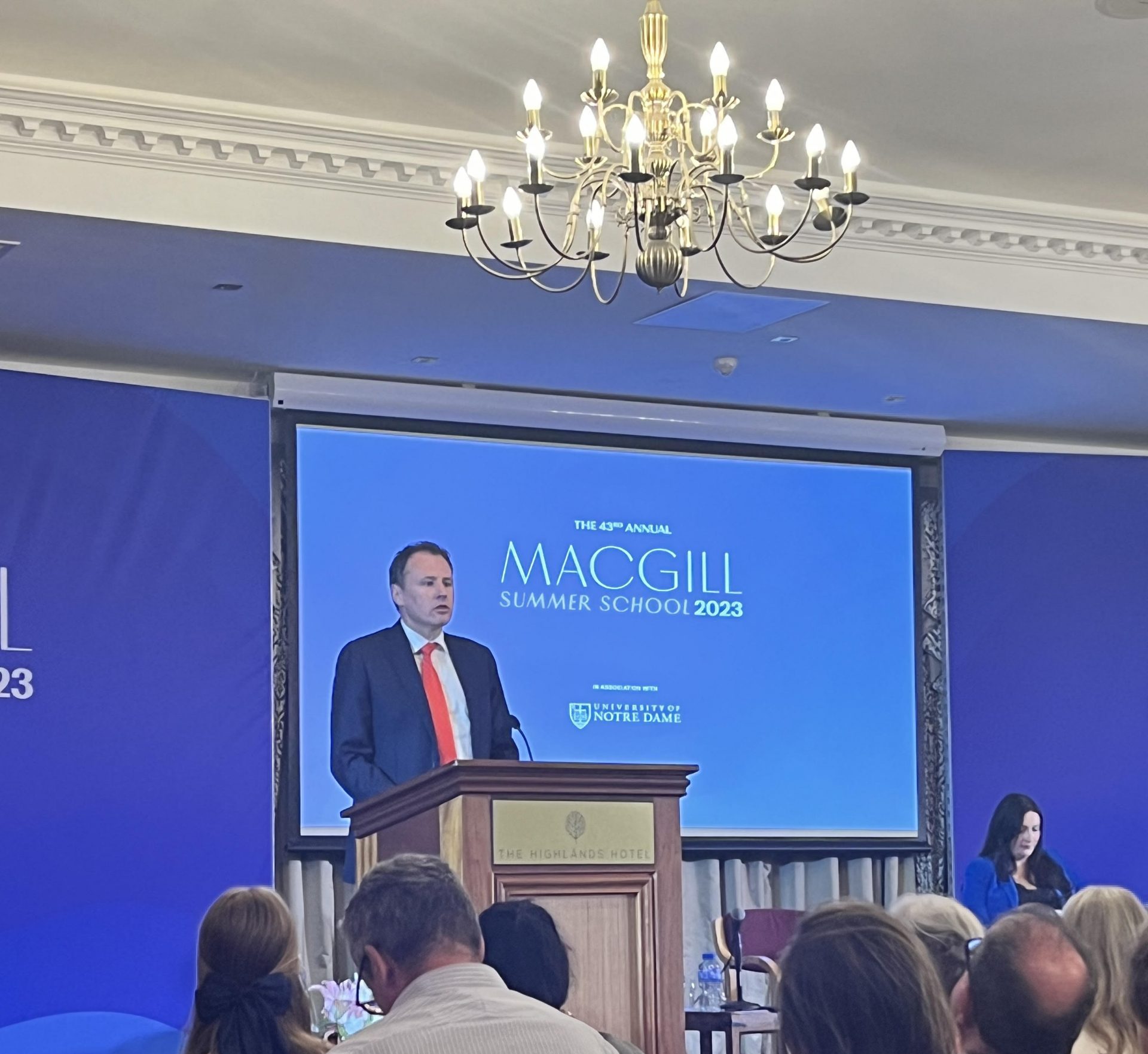
He says he was to see it flourish in all its dimensions.
Minister McConalogue says the agreement signed 25 years ago helped unlock the economic dividends of peace and helped facilitate the development of the all island economy.
He added that the Irish Government’s goal is to create a more sustainable and prosperous future for all communities.
Minister McConalogue says there is much to look forward to in the future on the island of Ireland:
8:13pm: Tommie Gorman has paid tribute to Dr Joe Mullholland and his wife Annie for giving “their hearts and souls” to the MacGill Summer School
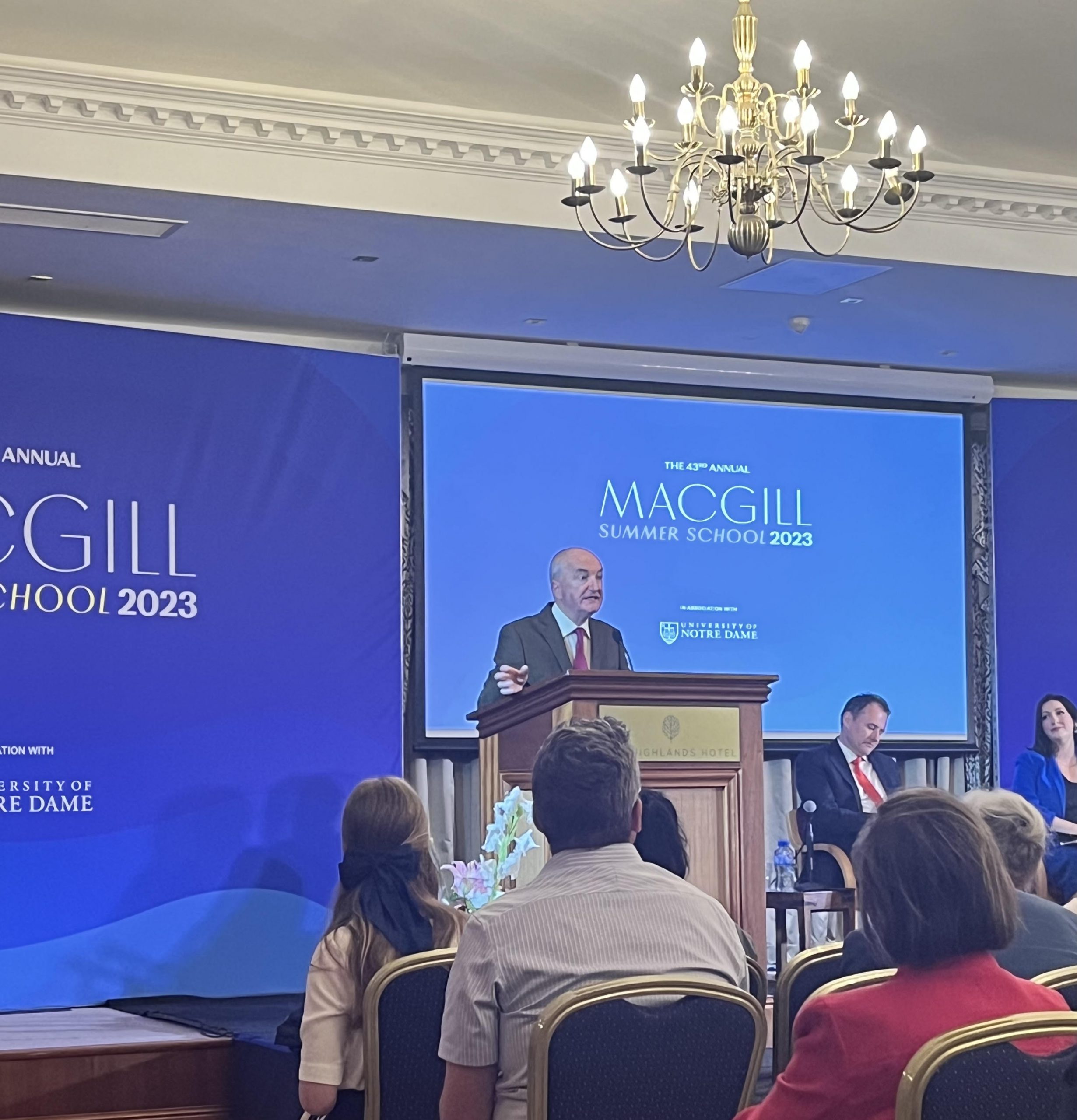
7:47pm: The final session of day three of MacGill Summer School will commence at 8pm
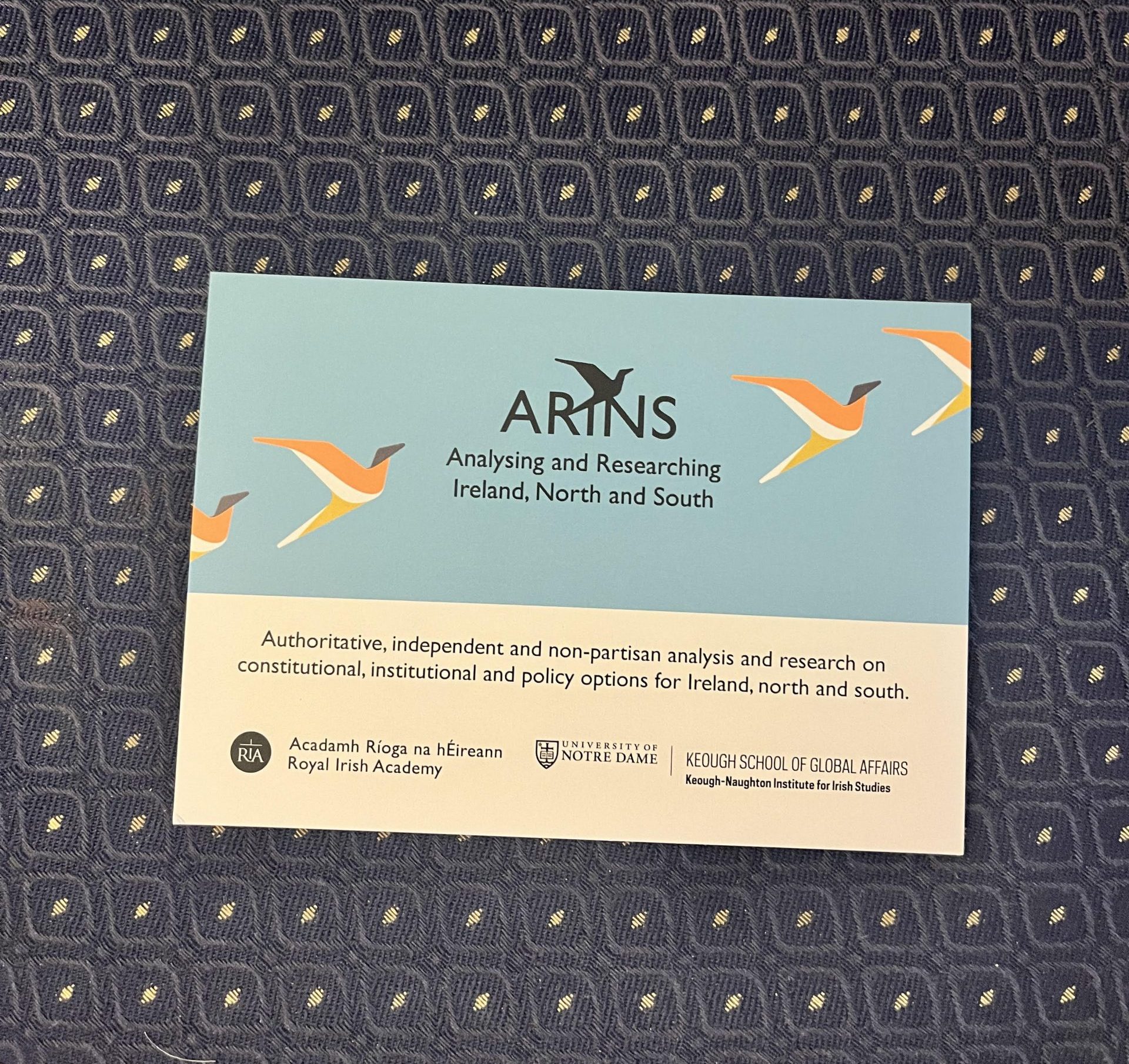
Tommie Gorman, journalist, author and former RTÉ Northern Editor will put the question ‘Ireland – The future?’ to Charlie McConalogue, Minister for Agriculture, Food and the Marine, Sinn Fein TD, Rose Conway-Walsh, DUP MLA Emma Little-Pengelly and SDLP MP Claire Hanna.
6:19pm: The Brian Friel Centre in Glenties is to open in October 2025 to coincide with the tenth anniversary of the death of the renowned playwright
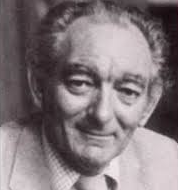
The Brian Friel Trust has signed a lease Agreement with Donegal County Council to establish a dedicated centre at the old Courthouse in Glenties while a stage set is to be developed at ‘The Laurels’ cottage, the setting for Friel’s ‘Dancing at Lughnasa’.
The MacGill Summer School has heard that the old Courthouse building will be transformed into an interactive visitor centre and include Brian Friel’s reading library, donated to the Trust by his wife, Anne.
4:38pm: Footage of Seamus Heaney reciting a poem and paying tribute to playwright Brian Friel at a previous MacGill Summer School is being played to those gathered in the Highland Hotel, Glenties, interspersed with footage of Friel it is a touching tribute to two literary greats.
The crowd is being treated also to a prizewinning documentary on Friel’s life and work, ‘Shy Man, Showman’.
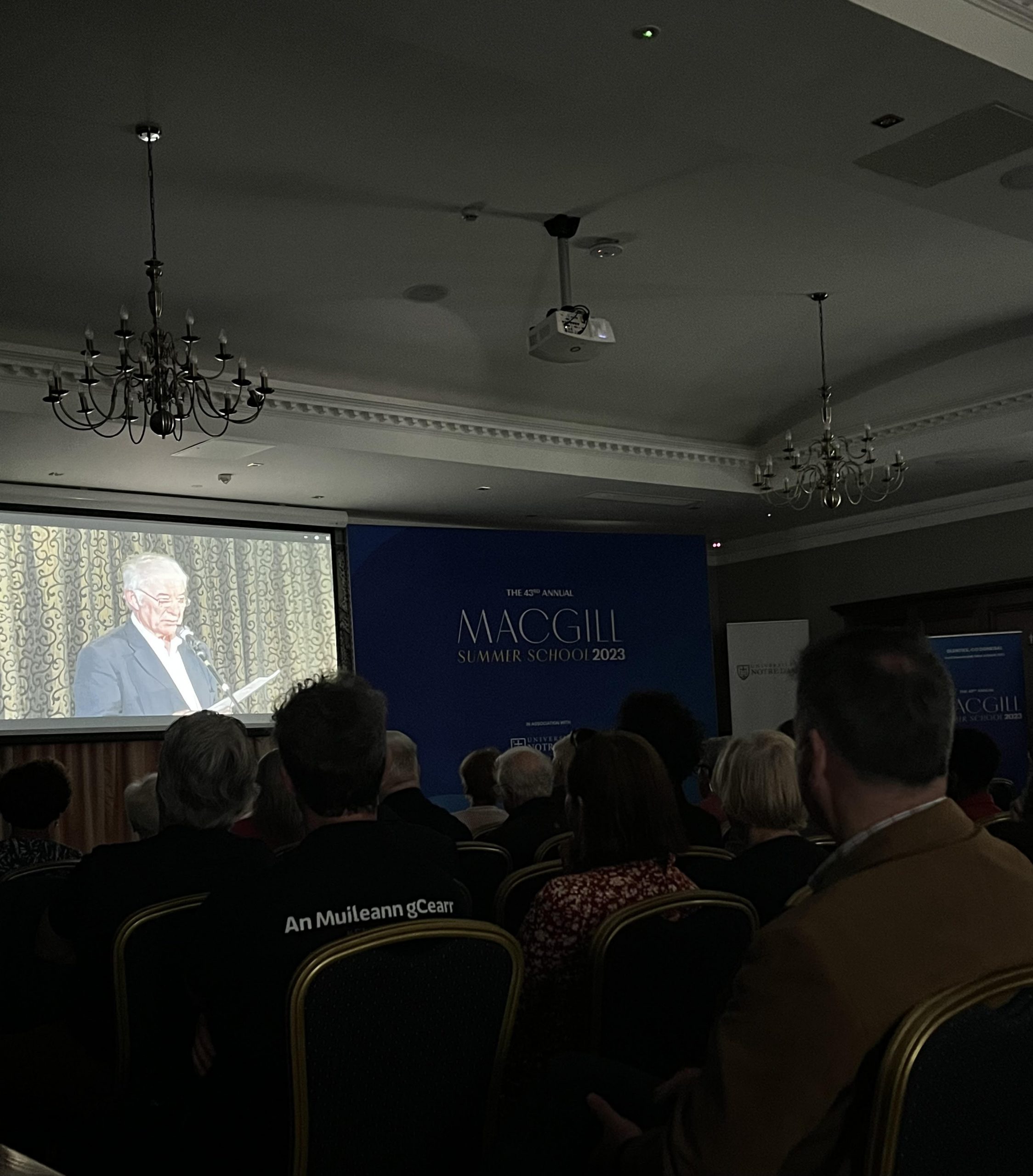
4:35pm: Ahead of the screening of a film to remember renowned poet Seamus Heaney on the tenth anniversary of his passing, Dr Joe Mullholland says 10 years ago a vacuum was left in Irish life as he affected Irish life in so many ways
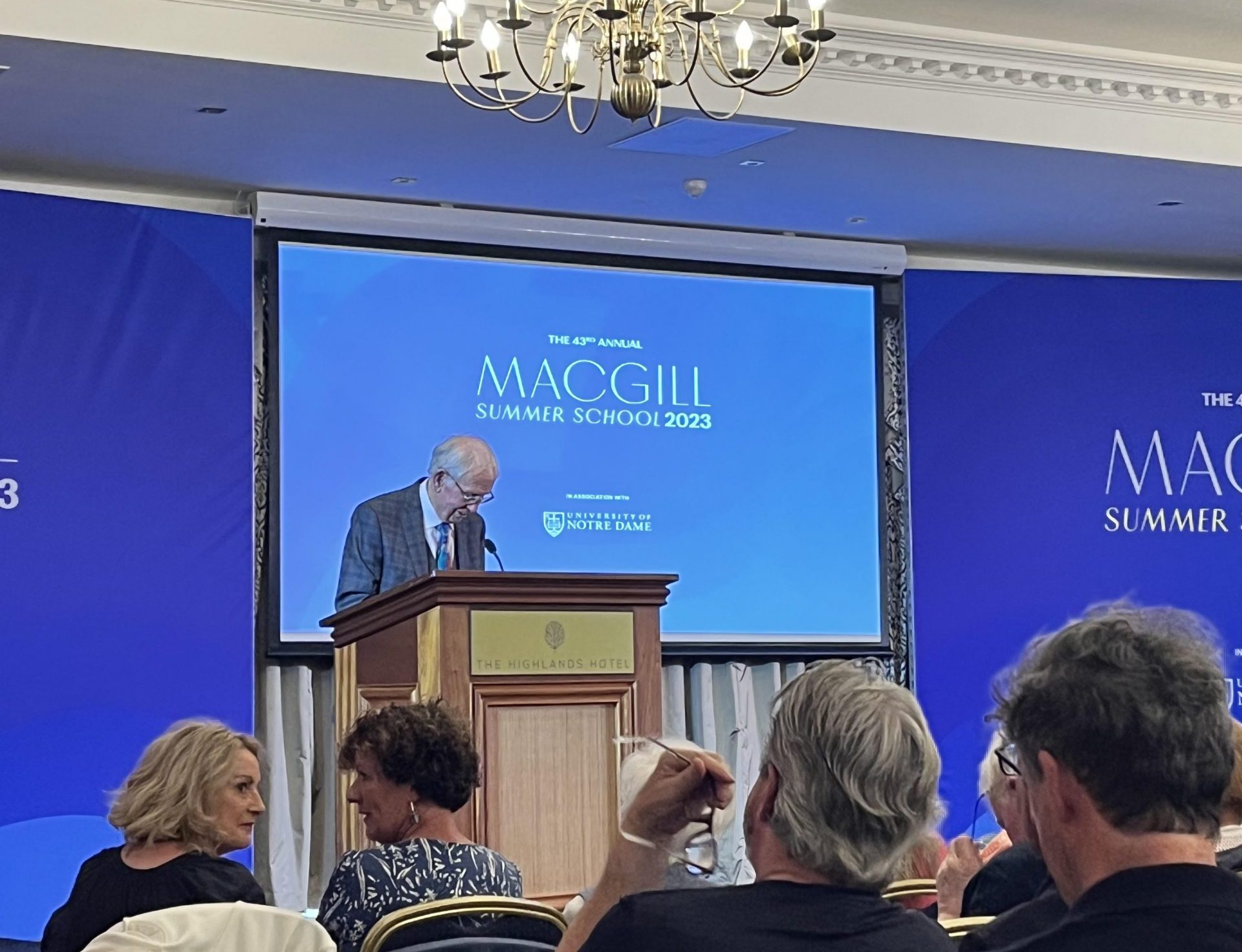
3:24pm: The prospect of a Sinn Fein led Government instils dread in Senator McDowell.
He has told the MacGill Summer School that Sinn Fein is no ordinary party.
Senator McDowell says entering into Government with the party it is a scary thought:
3:17pm: When pressed for his thoughts on the current Government make up, Senator Michael McDowell says Fine Gael and Fianna Fail have made an “absolute hames of the housing crisis,” making “mistake after mistake.”
He says private landlords have been run out of the market by Government who have not used the powers available to them.
Senator McDowell expects the mess made of the housing crisis is not going to be forgiven at the polls. He is certain Government is not going to be re-elected in its current form:
3:02pm: Senator McDowell says Des O’Malley’s decision to step down as leader of the Progressive Democrats came as a surprise to him.
He says Mr O’Malley felt he wasn’t enjoying being leader of the party.
Senator McDowell became leader of the Progressive Democrats in September 2006 but he believes the writing was on the wall in terms of the end of the party and says “people were getting tired” of them.
He eventually stepped down as party leader when he lost his seat.
Senator McDowell says his decision to step up as a Senator was based on the possibility of the Seanad being abolished:
2:54pm: Senator McDowell says as a barrister the role of Attorney General was one he couldn’t turn down.
During his term as Minister for Justice says reforming An Garda Siochana and the liquor trade is among his proudest moments.
He has spoken of the great opposition he was met with when bringing forward policy to rollout café-bars.
2:44pm: Senator Michael McDowell believes in a coalition Government. He says ‘one party Government – no thanks.”
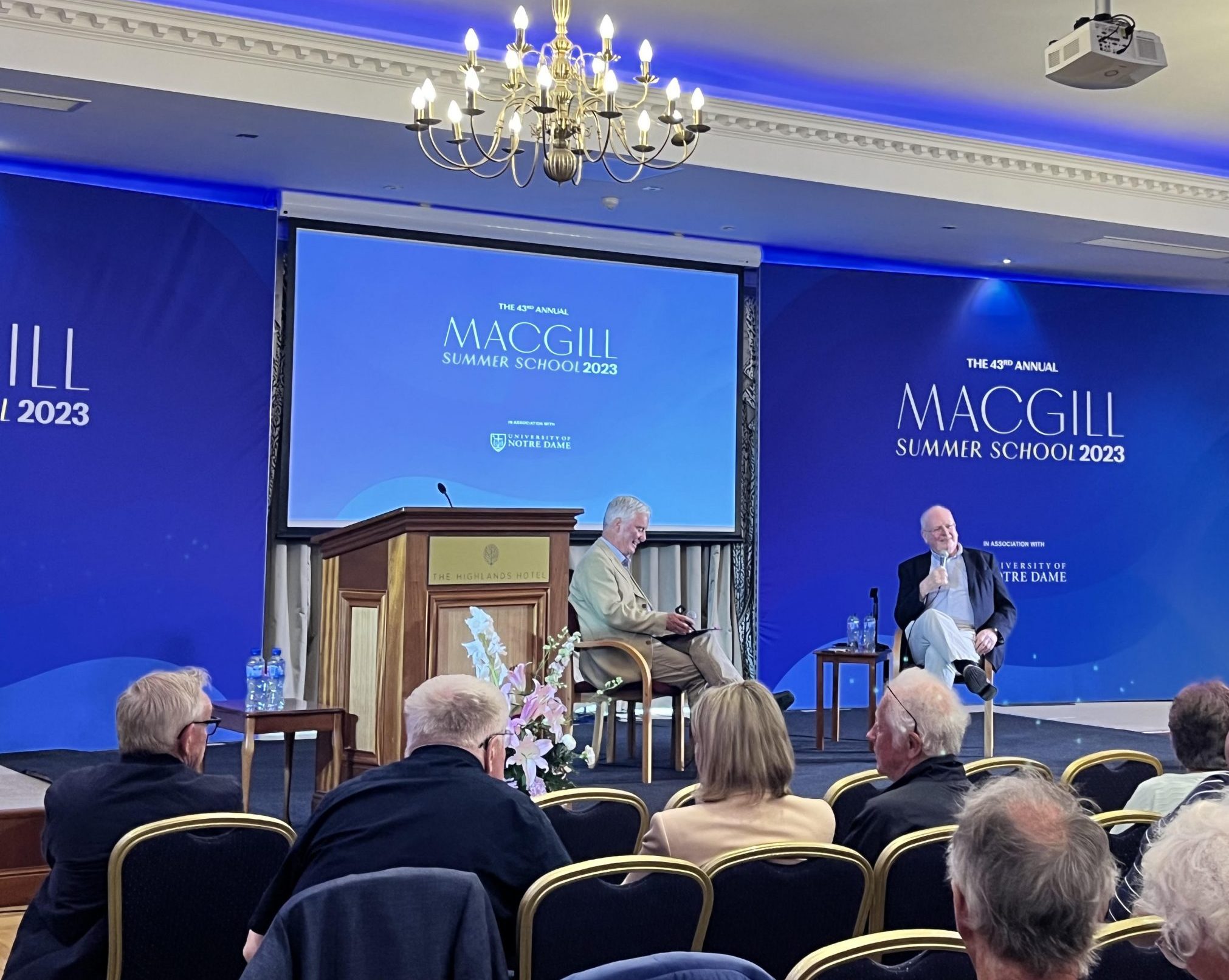
2:32pm: A large crowd has gathered to hear Senator Michael McDowell in conversation with Stephen Collins, Irish Times Journalist & Author
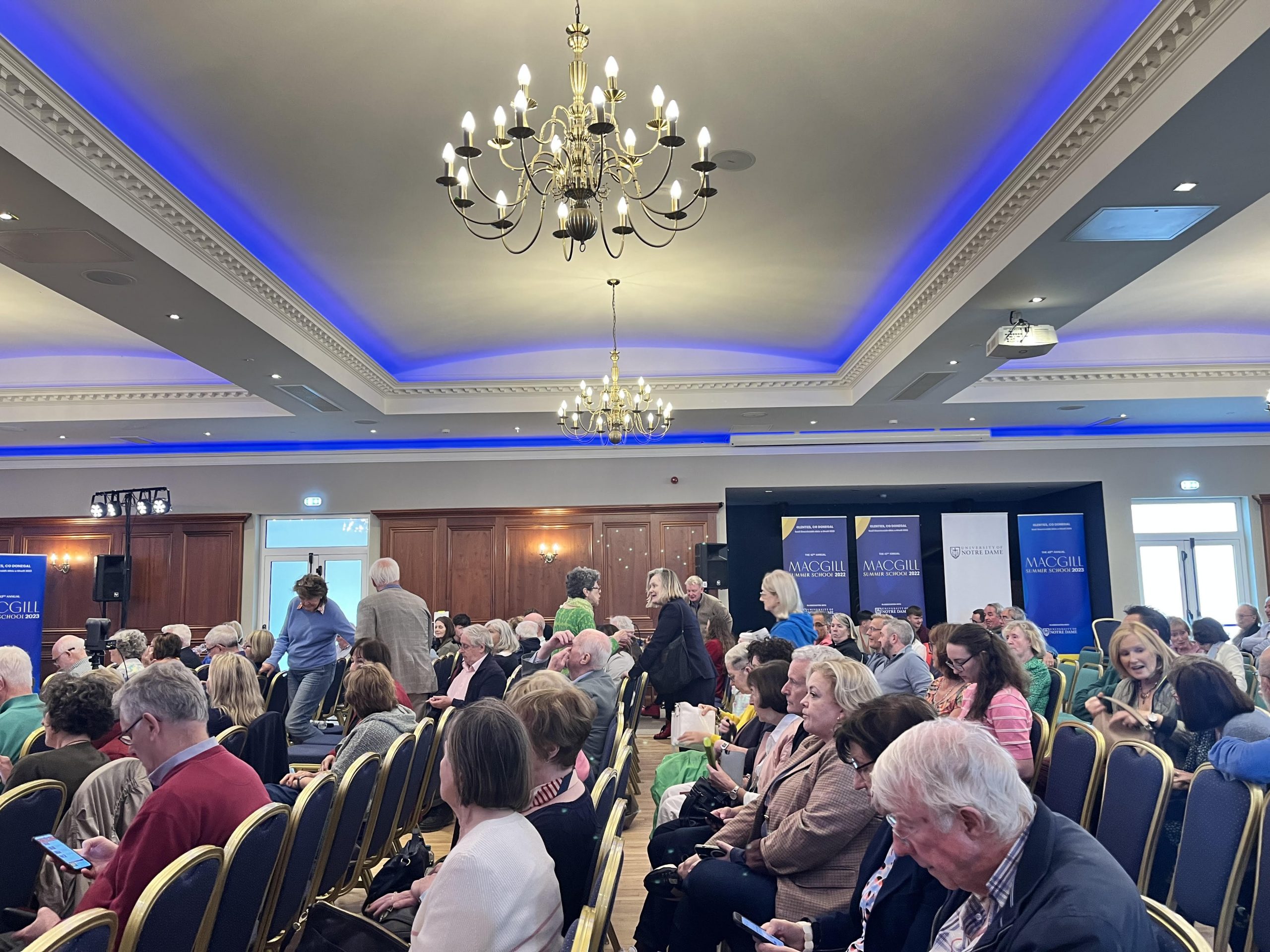
1:32pm: Dr Sergei Medvedev who is Russian but left the state when the Ukrainian war broke out says there is no negotiating with a “criminal” in Putin
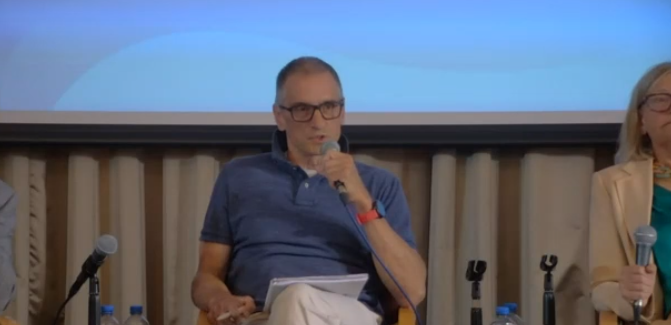
He says Putin needs to be listened to as an equal.
Dr Medvedev who is pro-Putin however, says he is not an equal:
12:58pm: Zhou Bo stated that Russian military began the Ukrainian war fighting “badly” but says Russian military is learning and that history seems to suggest that the Russian army never fights well in the beginning of a battle.
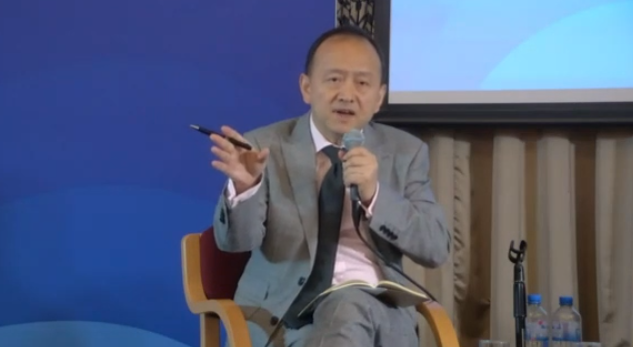
12:41pm: Professor Brigid Laffan has told the crowd gathered at the MacGill Summer School that war is rarely the answer to anything. If someone invades your country she says, you put up the white flag or you fight and in her view Ukrainians had no other choice but to fight.
That was echoed by Dr Pt Cox, former President of the European Parliament in his closing remarks:
12:21pm: Discussions have moved to NATO
Zhou Bo said EU Commissioner Mairead McGuinness’ criticism of his argument that a NATO expansion is the reason for the Russian invasion of Ukraine is “totally wrong.”
Professor Laffan meanwhile, says the purpose of NATO must be remembered:
11:52am: “Putin should be defeated in this war” – Professor Brigid Laffan, Emeritus Professor at the University Institute, Florence
It is Professor Laffan’s view that Russia has broken deep fundamental elements of global order and has conducted a war of brutality and breached human rights.
She says Europe has passed the point of no return in Putin’s Russia.
11:44am: With opinion polls reflecting 80% of Russians support Vladimir Putin, Dr Sergei Medvedev, a native of Russia says it is a true reflection of some reality as there are indeed people who support everything the Russian leader says and does.
11:30am: When will the Putin era end?
Zhou Bo, retired Colonel firmly believes after the Ukrainian war, Russia and The West will be weakened.
While the end of the war is unknown, he believes a longer Cold War will ensue.
Mr Bo says Russia and China have different world views but added that he expects Russia will become more dependent on China.
Meanwhile, Dr Sergei Medvedev, Charles University, Prague has labelled Russia an “outdated empire.”
He says it is a country that prides itself on its past, that has turned to its past and has started a war based on its past with an outdated military.
Adding to the sentiment that Russia is stuck in the past, Dr Medvedev says Putin has taken the country to the past where it is stuck. He is of the opinion that there is no chance now of Russia being able to transport itself into the future.
Dr Medvedev – Russia’s power is “outdated, archaic and stuck back in time.”
In terms of the picture of a European Russia he believes it “is becoming more outmoded.”
11:19am: Dr Pat Cox, former President of the European Parliament sets the scene and poses the questions – what is Russia’s place in the world in the Putin era and what is that relationship in a post Putin environment?
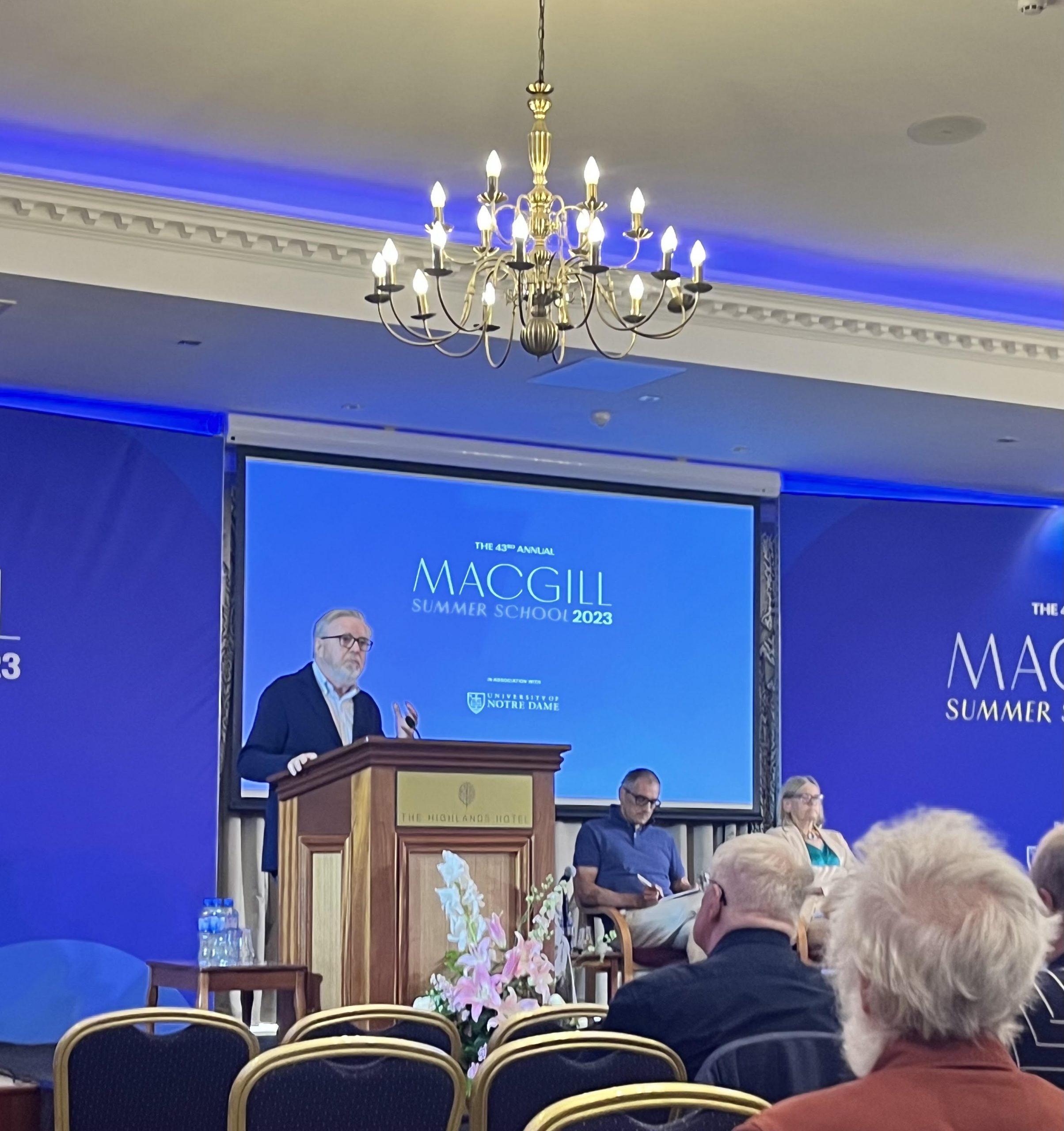
Dr Cox says trying to get a feel of how peace can be found is “not going to get us very far.”
He says there are so many moving parts that it is difficult to predict the end of the Ukrainian war.
11:01am: EU Commissioner Mairead McGuinness interview
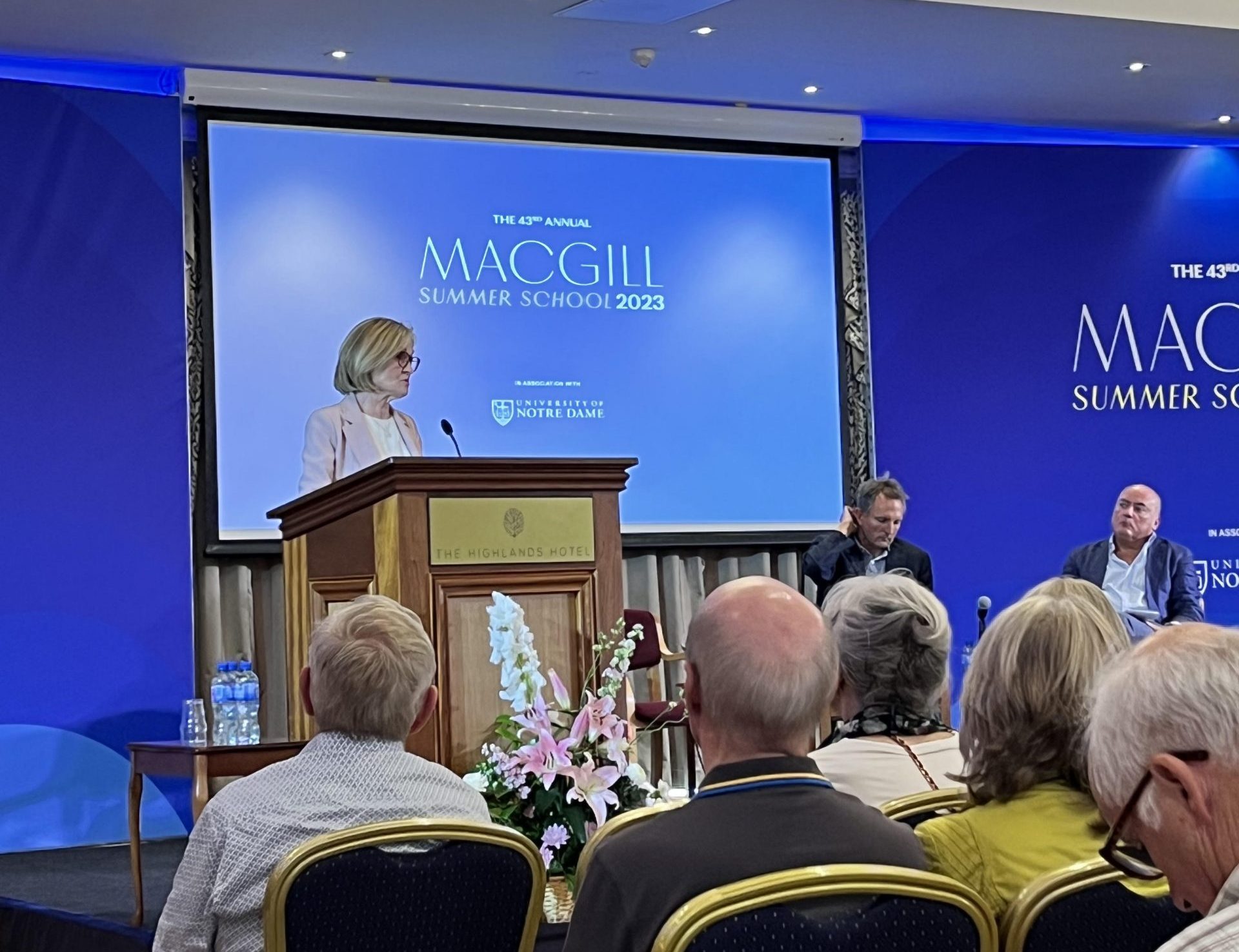
The EU Commissioner says they cannot move forward with the European Green Deal without farmers.
Speaking at this week’s MacGill Summer School in Glenties, Commissioner Mairead McGuinness acknowledged that farmers are anxious about their future.
The European Green Deal is a €1 trillion programme which commits Europe to become climate neutral by 2050.
Commissioner McGuinness says efforts need to be made to encourage a shift in how farmers view sustainability:
10:36am: Day three of MacGill Summer School
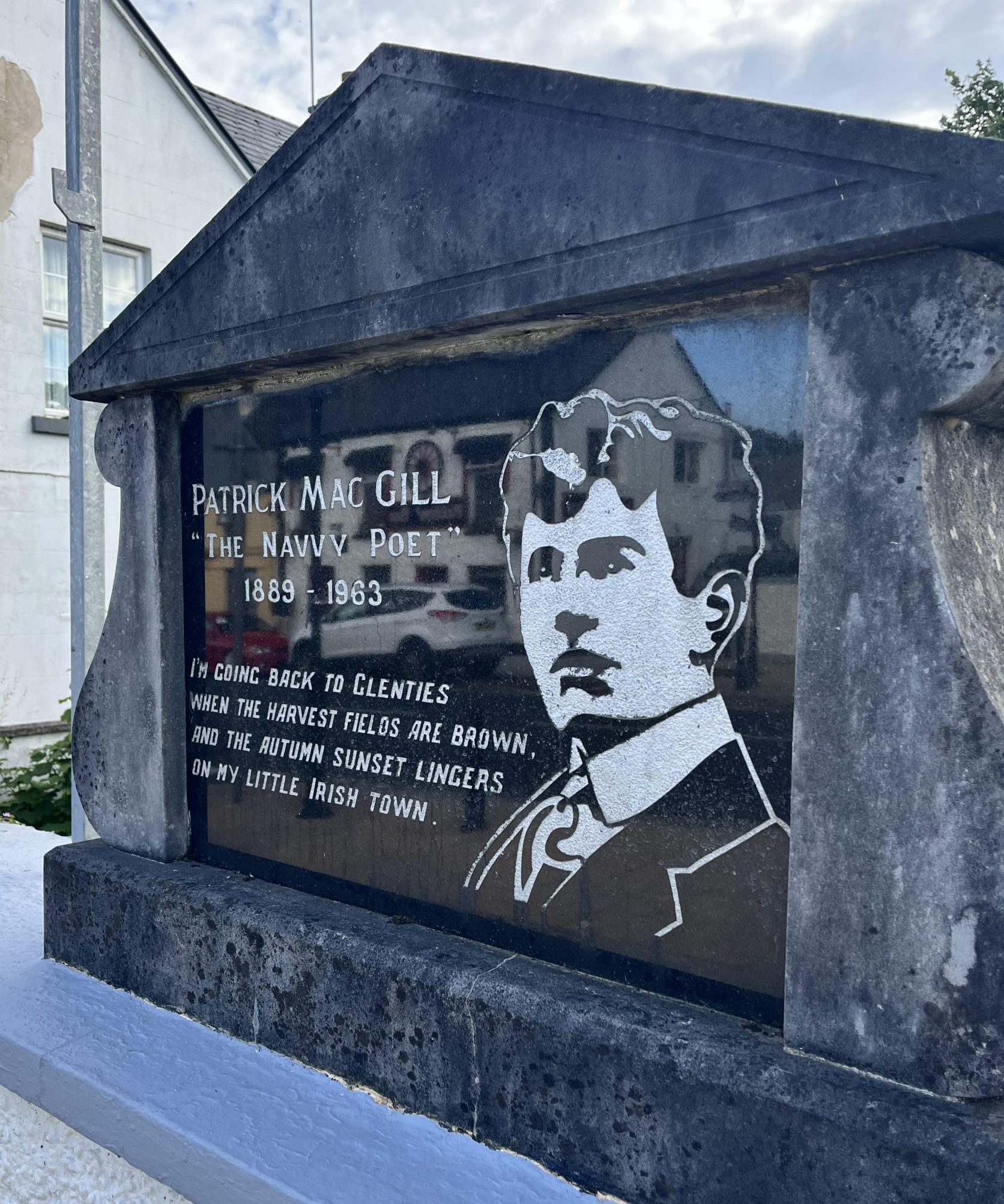
The future of Russia and its place in the world will kick off today’s events. Taking part in that discussion is; Dr Sergei Medvedev, Charles University, Prague, Professor Brigid Laffan, Emeritus Professor at the University Institute, Florence and Zhou Bo, retired colonel, Tsinghjua University.
This afternoon, Senator Michael McDowell will be in conversation with The Irish Times former Political Editor, Stephen Collins.
Also, on the tenth anniversary of his passing, poet Seamus Heaney will be remembered along with playwright, Brian Friel.
To conclude the penultimate day of the 43rd MacGill Summer School DUP MLA Emma Little-Pengelly, SDLP MP Claire Hanna, Sinn Fein Deputy Rose Conway-Walsh and Agriculture, Food and the Marine Minister, Charlie McConalogue will consider the future shape of the island of Ireland.
9:20pm: Signing off day two at MacGill Summer School
9:18pm: A special presentation has been made this evening to the Director of the MacGill Summer School, Dr Joe Mullholland
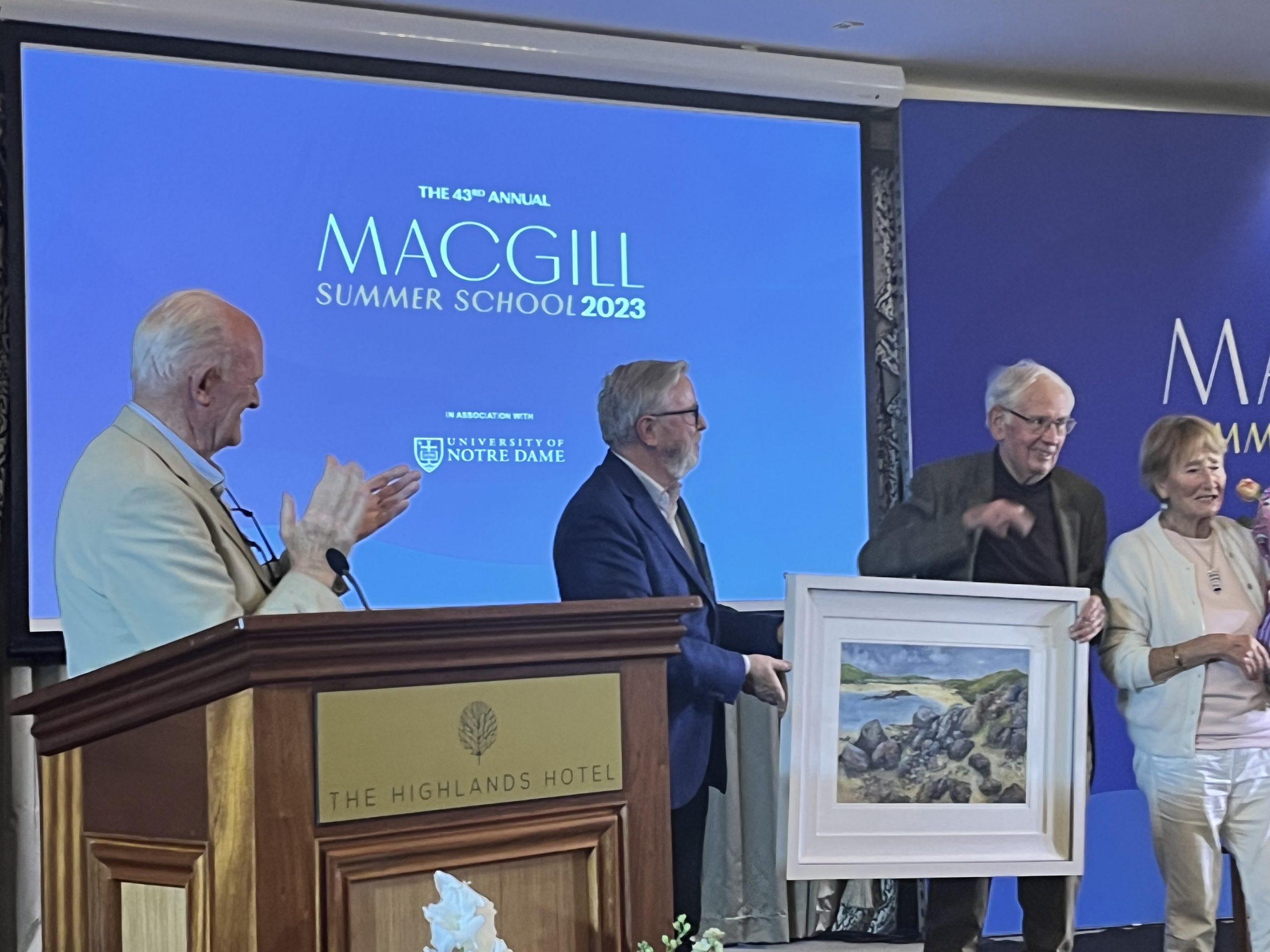
A commissioned painting of St John’s Point was presented to Dr Mullholland.
Pat Cox, former President of the European Parliament, praised his inspirational and personal commitment to the MacGill Summer School over the years.
Dr Mullholland himself spoke of how he has enjoyed organising all his life from having been born to a working class family in Stranorlar.
He added that he is delighted to have met so many fantastic people during the tenure of MacGill Summer School.
Dr Mullholland finished by saying I’m “not about to give up!”
8:51pm: Congressman Brendan Boyle was asked if he would consider throwing his name into the hat in the run for the Presidential election.
In response, he told the crowd in Glenties that he isn’t ruling anything out:
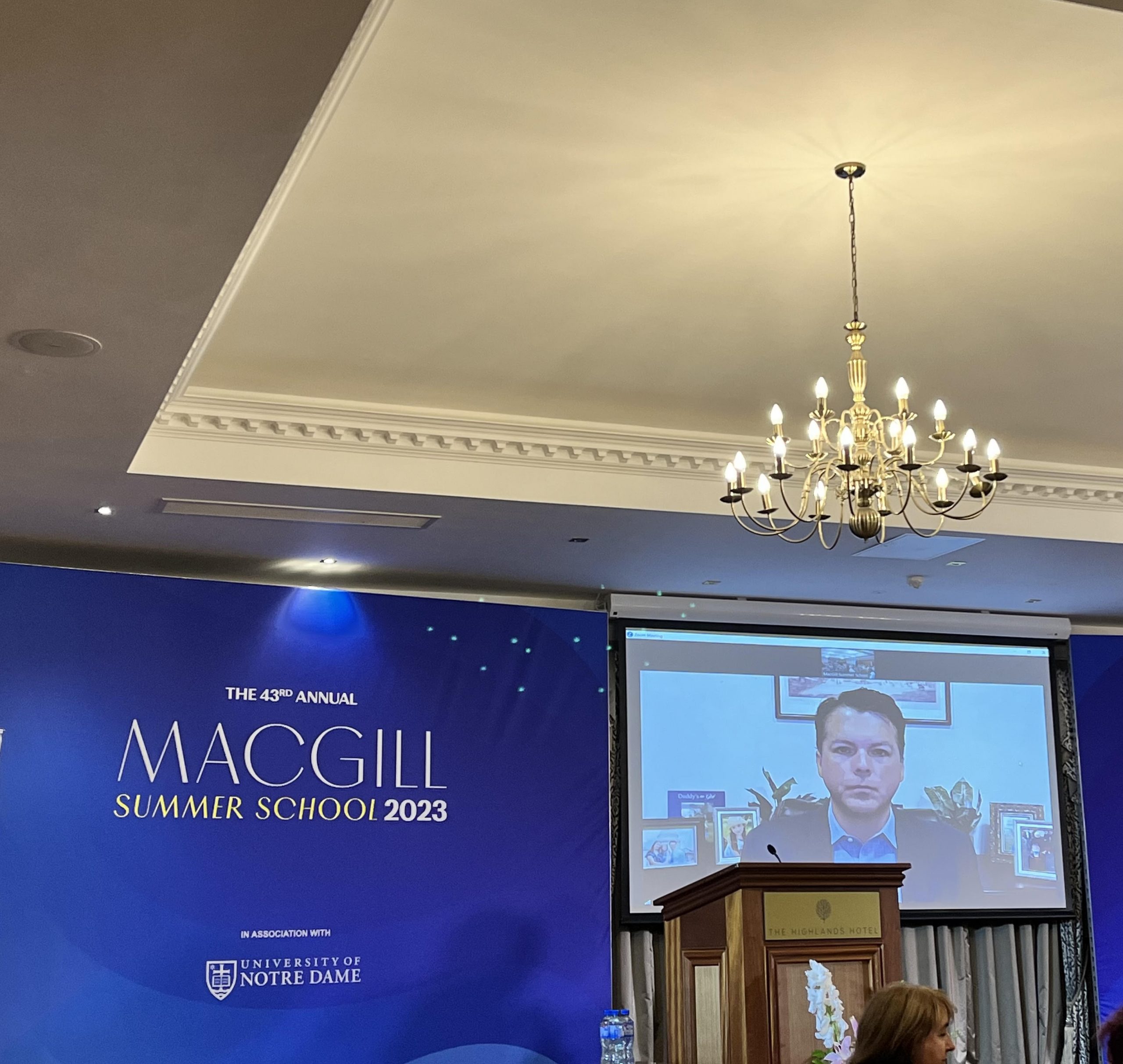
8:45pm: Congressman Boyle, speaking in terms of the Ukrainian war, says Vladimir Putin is counting on people “tiring of the war.”
8:43pm: US President Joe Biden is expected to win a second term. That’s according to US Congressman Brendan Boyle.
He says President Biden’s focus over the coming months will be on domestic policy but similar to those who previously held the role, Biden will dedicate his second term to foreign policy.
8:33pm: In switching focus to US politics, Congressman Boyle says there is great bewilderment that a US Presidential nominee in the form of Donald Trump who is facing almost 100 charges could be considered.
He says it is a very real possibility that Donald Trump could be the chosen Republican Presidential nominee and a convicted felon at the same time.
8:29pm: John Hume has been described as an ‘inspiration’.
US Congressman Brendan Boyle delivers the Annual John Hume Lecture:
Congressman Boyle says the 25th anniversary of both the Good Friday Agreement and the Omagh Bomb this year is a reminder of how far the island of Ireland has come in terms of peace.
Tuesday marked 25 years since the Omagh Bomb which claimed the lives of 29 people. It has been labelled a “cruel, heinous, disgusting attack” by Congressman Boyle.
8:21pm: “I am proud descendant of Donegal” – US Congressman Brendan Boyle
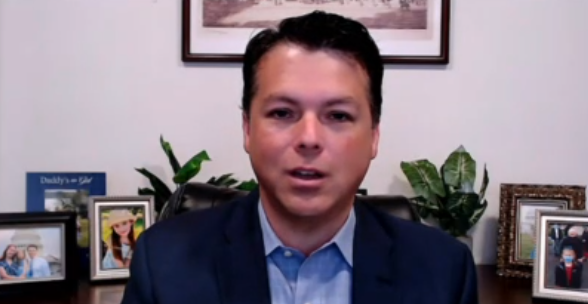
In his opening remarks, Congressman Boyle says he has visited other 30 countries and would take the beach and strand in Glencolmcille any day:
7:24pm: The 23rd Annual John Hume Lecture will conclude day two of MacGill Summer School
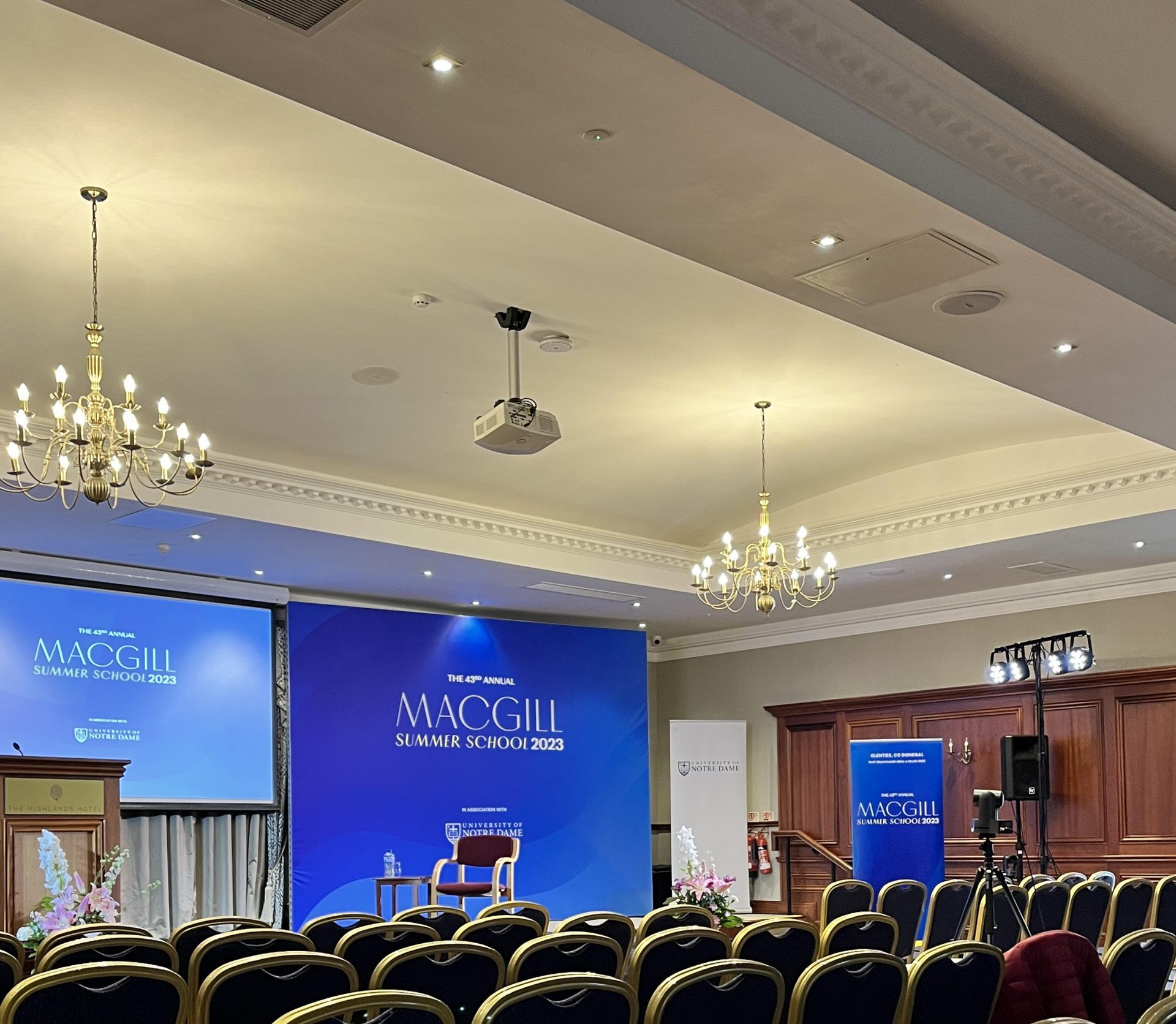
The much-anticipated lecture will be delivered virtually by US Congressman Brendan Boyle whose father hails from Glencolmcille.
It gets underway at 8pm.
6:55pm: Rare and discontinued books on display at MacGill Summer School – plenty to stimulate the mind in Glenties!
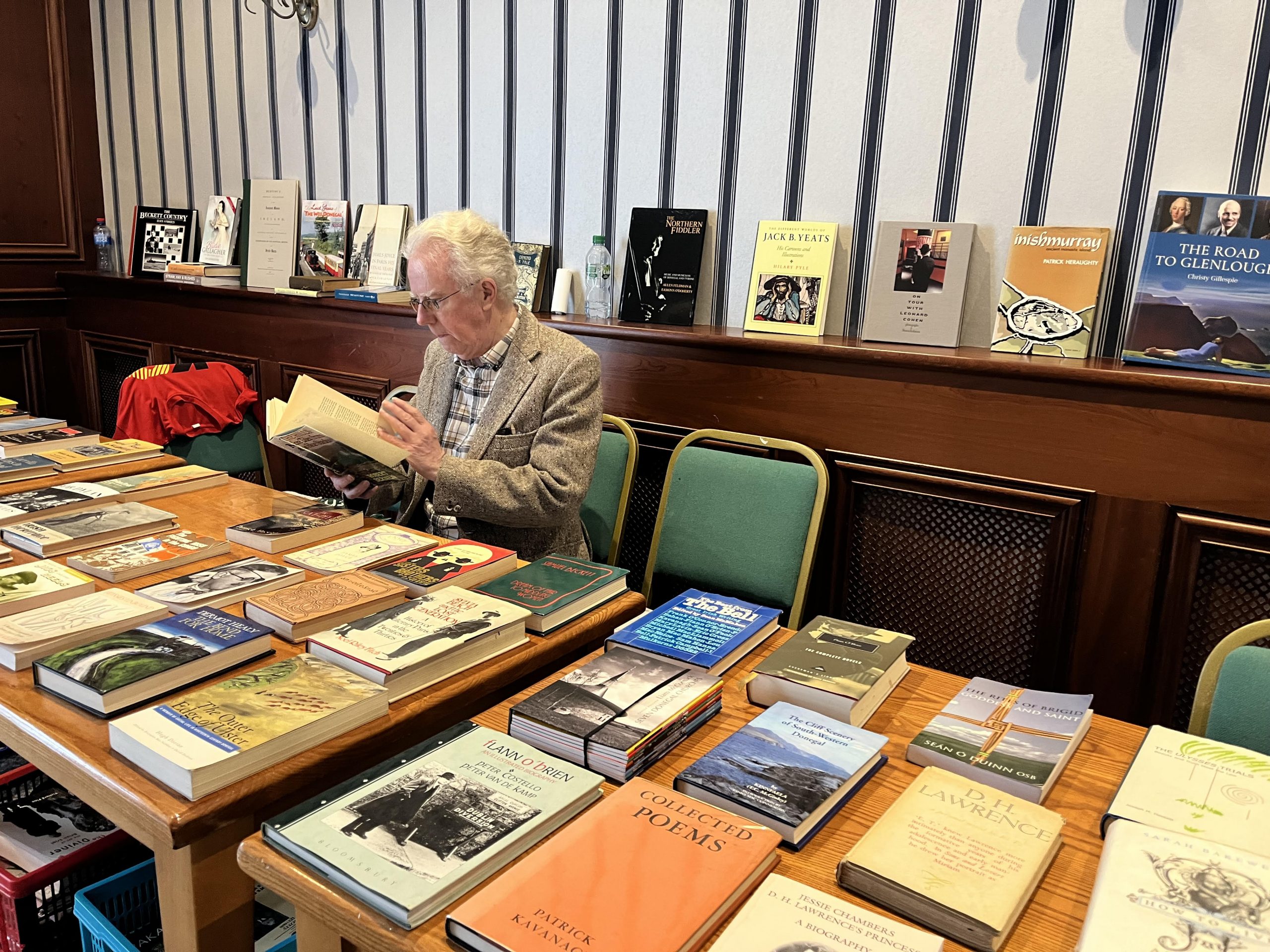
6:32pm: A GAA Exhibition match between students from the University of Notre Dame and Naomh Conaill, Glenties is underway
With #EU commissioner @McGuinnessEU
From field to forum, from pitch to politics @notredame students have it covered @MacGillSchool @KeoughGlobalND #Glenties pic.twitter.com/MdN6X1dR55— @NDIrishStudies (@NDIrishStudies) August 17, 2023
The MacGill Summer School is delivered in association with the University of Notre Dame.
EU Commissioner Mairead McGuinness had the honour of throwing the match ball.
5:23pm: ‘The Irish Economy – large surpluses but will they be used for long-term national gain?’ – Professor Seamus Coffey, UCC discusses
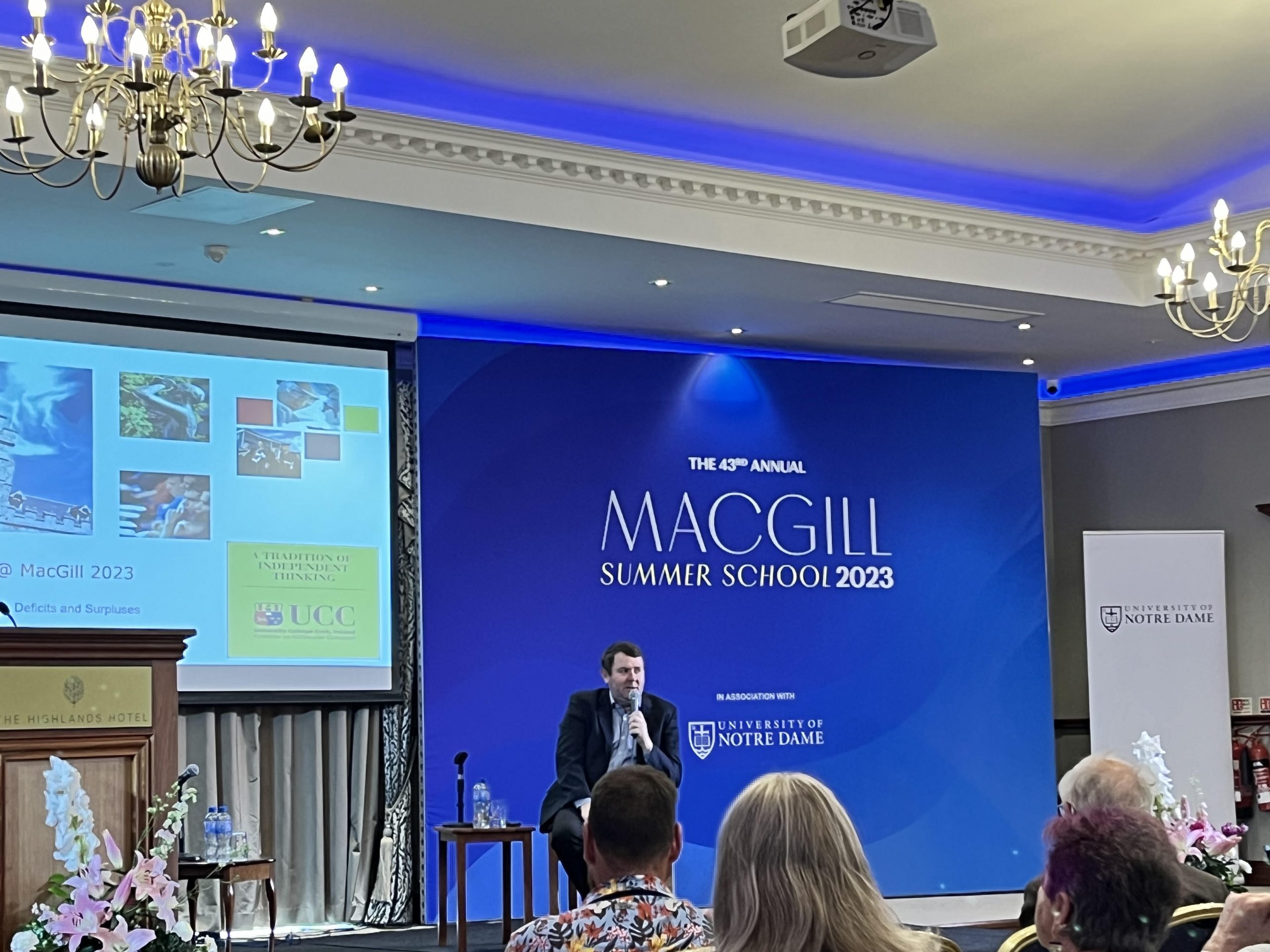
Professor Coffey says while there is national debt, about €40,000 per capita, it is not necessarily a risk at the moment.
He did however, say that there still is a potential risk and one that will gradually happen.
Professor Coffey said Ireland could do more to reduce poverty.
3:42pm: RTÉ European Editor in Brussels, Tony Connelly says one of the biggest issues coming down the tracks for Irish people is the European Budget
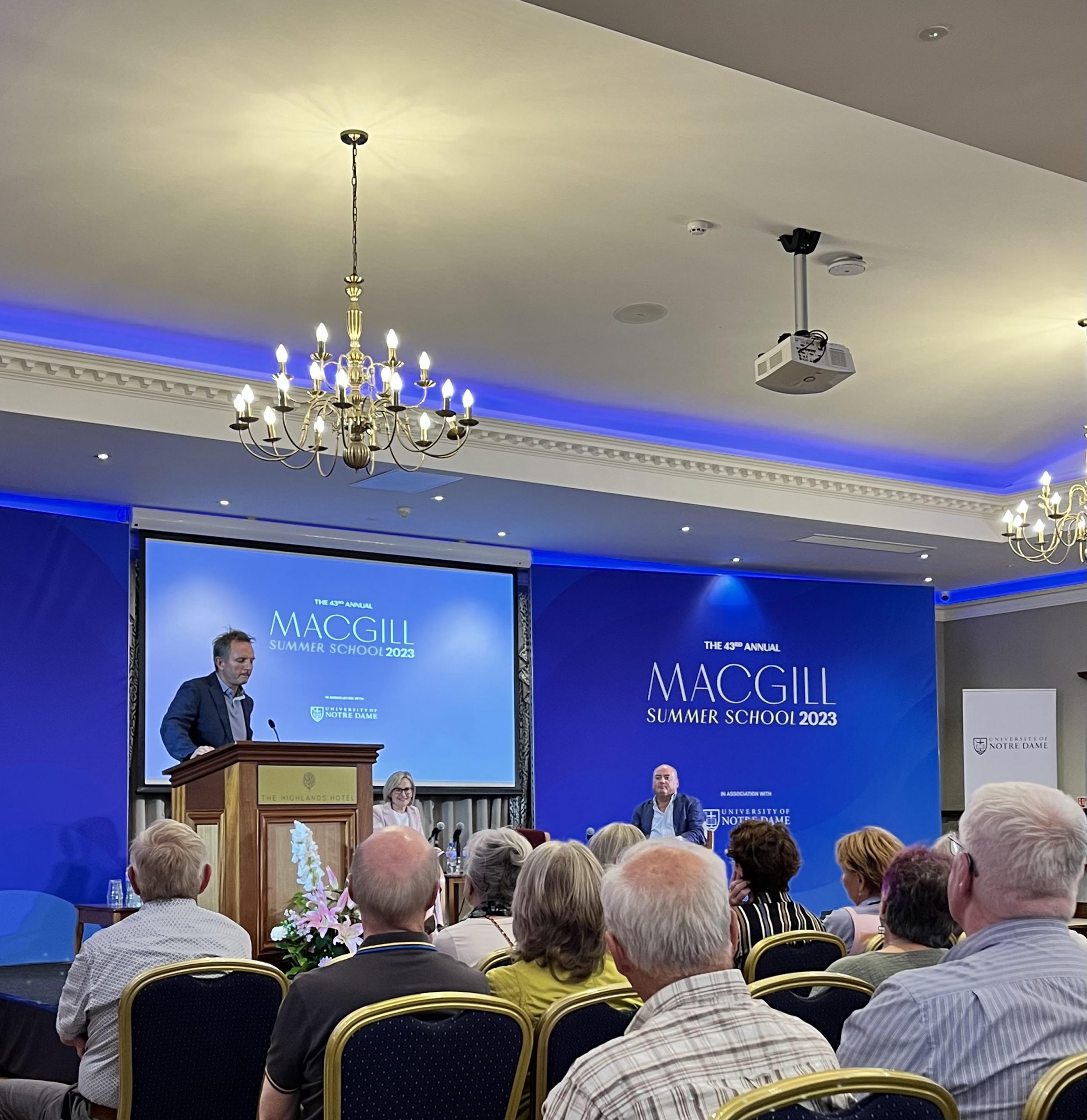
The European Budget is to be reviewed this Autumn with a huge chunk of it set to be allocated to Ukraine. However, Mr Connelly believes there are other areas which require a major funding boost also.
He says; “the European Budget is simply not fit for purpose.”
The RTÉ Editor says the budget is going to cause major problems and issues in the coming years.
3:22pm: Professor Brigid Laffan, Emeritus Professor at the European Institute, Florence has warned that the war in Ukraine cannot distract from the climate crisis.
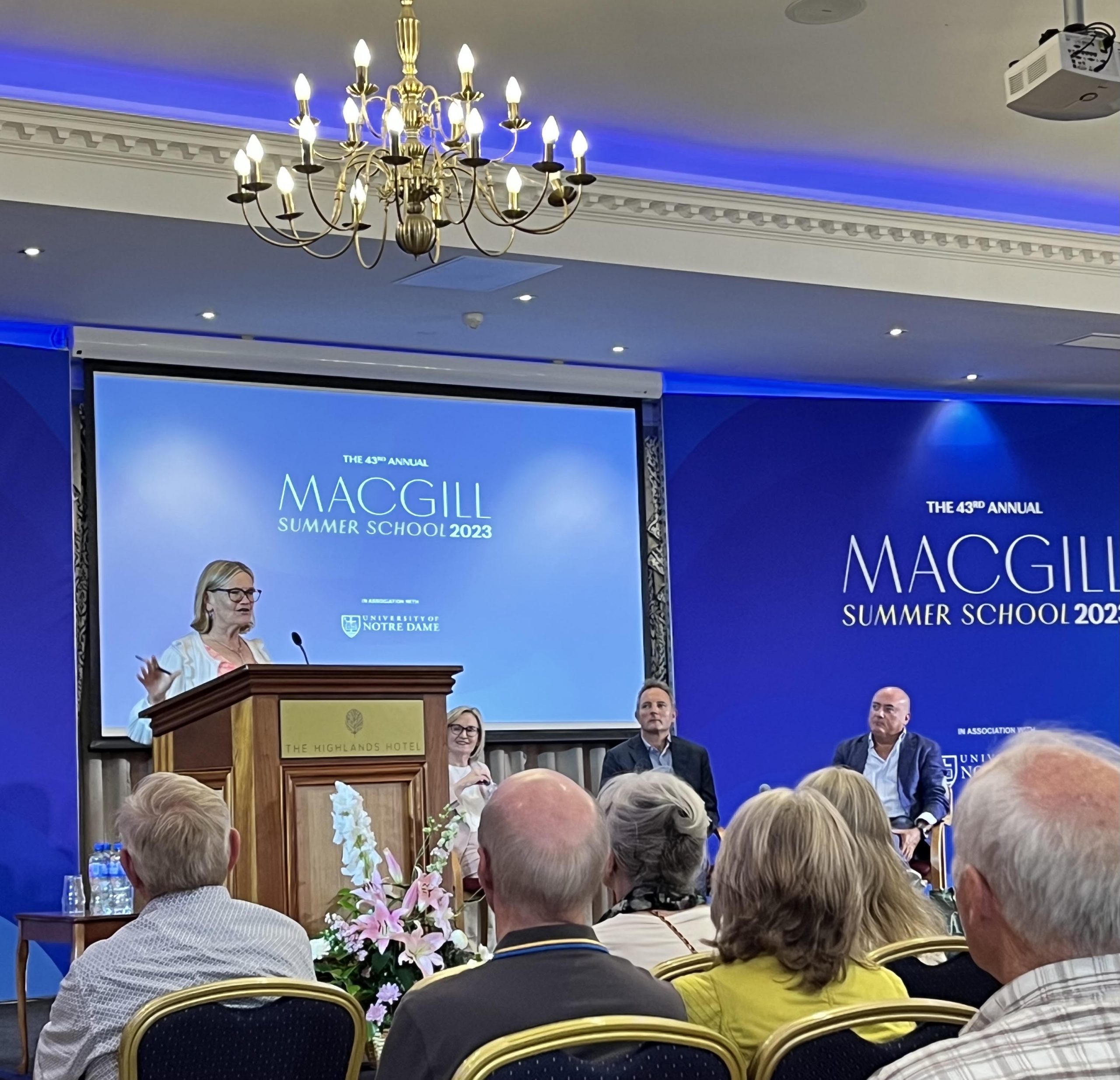
In her address, Professor Laffan says if Europe cannot get a grip on the climate crisis then it will bring the planet down.
In addition, she says the European Union has a responsibility to act in the face of challenges and has so far, been stress tested over the past 10 years and has met those challenges.
In her forecast to the future, Professor Laffan believes there will be a referendum on a European Treaty in the coming years which she says will bring its own political challenges but says going forward, “we need to track the way the EU is going and to see where Ireland lies in that.”
She finished by hitting out at earlier comments made by retired Colonel Zhou Bo:
3:15pm: Mairead McGuinness says “Europe needs to do more listening, listen to what the world is telling us.” She says the worst thing we can do is plough on and not listen to what is happening.
3:09pm: It has been proposed that more mining be carried out in Europe.
EU Commissioner Mairead McGuinness says if we want to take components from other parts of the world, we need to look at the impact mining has on other countries.
2:55pm: The EU Commissioner spoke of the challenges currently facing Europe including; the demographic challenges in terms of labour and the impact Artificial Intelligence has on the democratic process.
What she believed is more important that establishing a European army is an invisible army to fight off cyber attackers. Ms McGuinness wants to protect the finance system particularly, warning that a cyber attack would be catastrophic for the sector.
She acknowledged also that some people will find a green and digital transition difficult but says there is no option but to follow through with the process.
Ms McGuinness told today’s MacGill Summer School that the war in Ukraine has brought to a realisation Europe’s over dependency on Russia for fossil fuels which could be cut off at any time, not only impacting Europe but the entire world.
2:51pm: EU Commissioner Mairead McGuinness says the theme of this year’s MacGill Summer School – ‘A New Global Order? Precarious and Dangerous?’ “is a good summation of where the world is at today.”

2:37pm: Afternoon session gets underway
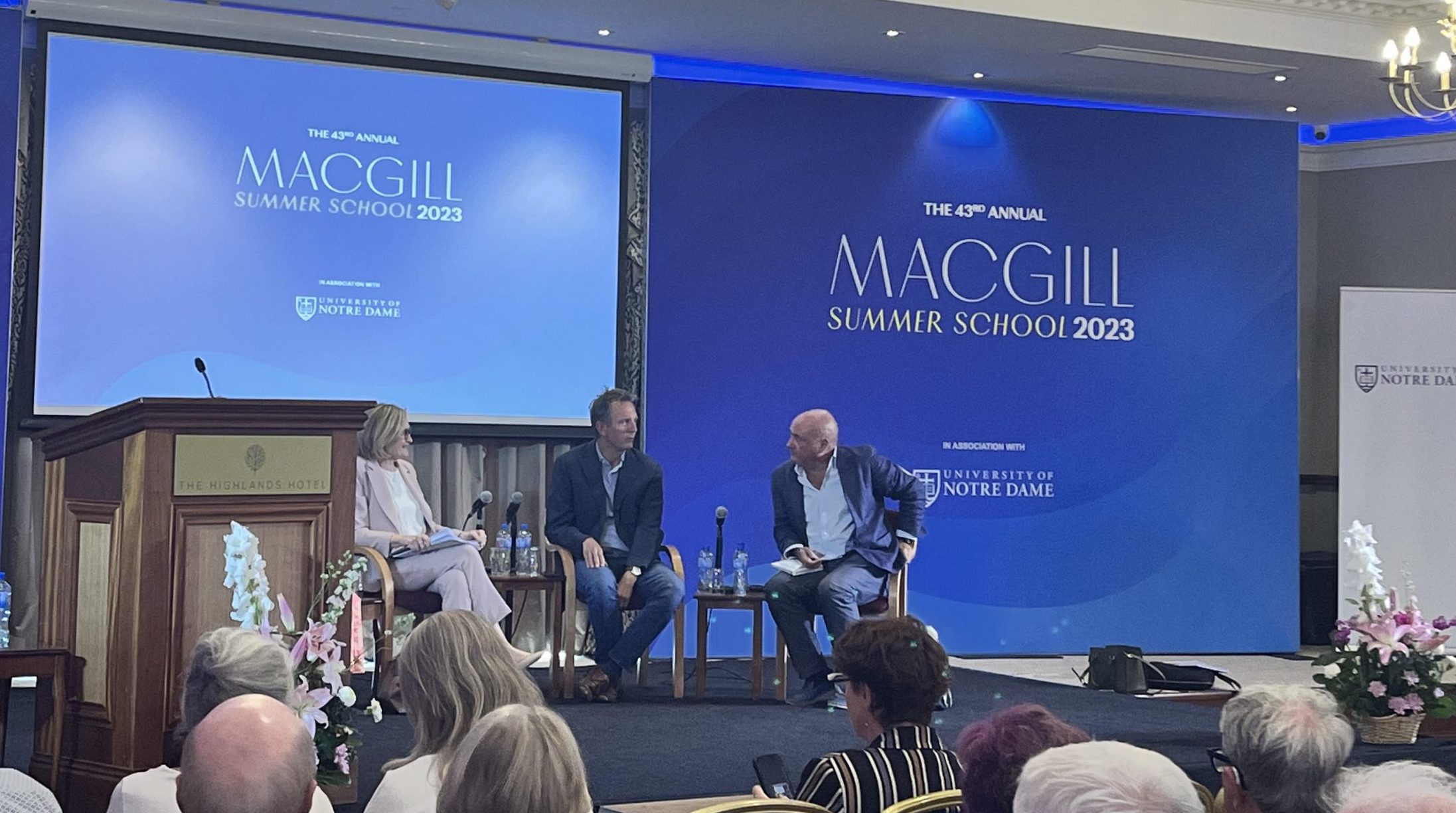
EU Commissioner for Finance Services, Financial Stability and Capital Markets, Mairead McGuinness, RTÉ European Editor in Brussels, Tony Connelly and Professor Brigid Laffan, Emeritus Professor at the European Institute, Florence are set to discuss ‘The European Union – How is its increasingly difficult and complex mission to be fulfilled?’
1:41pm: Blue skies in Glenties which has played host to the MacGill Summer School since 1981
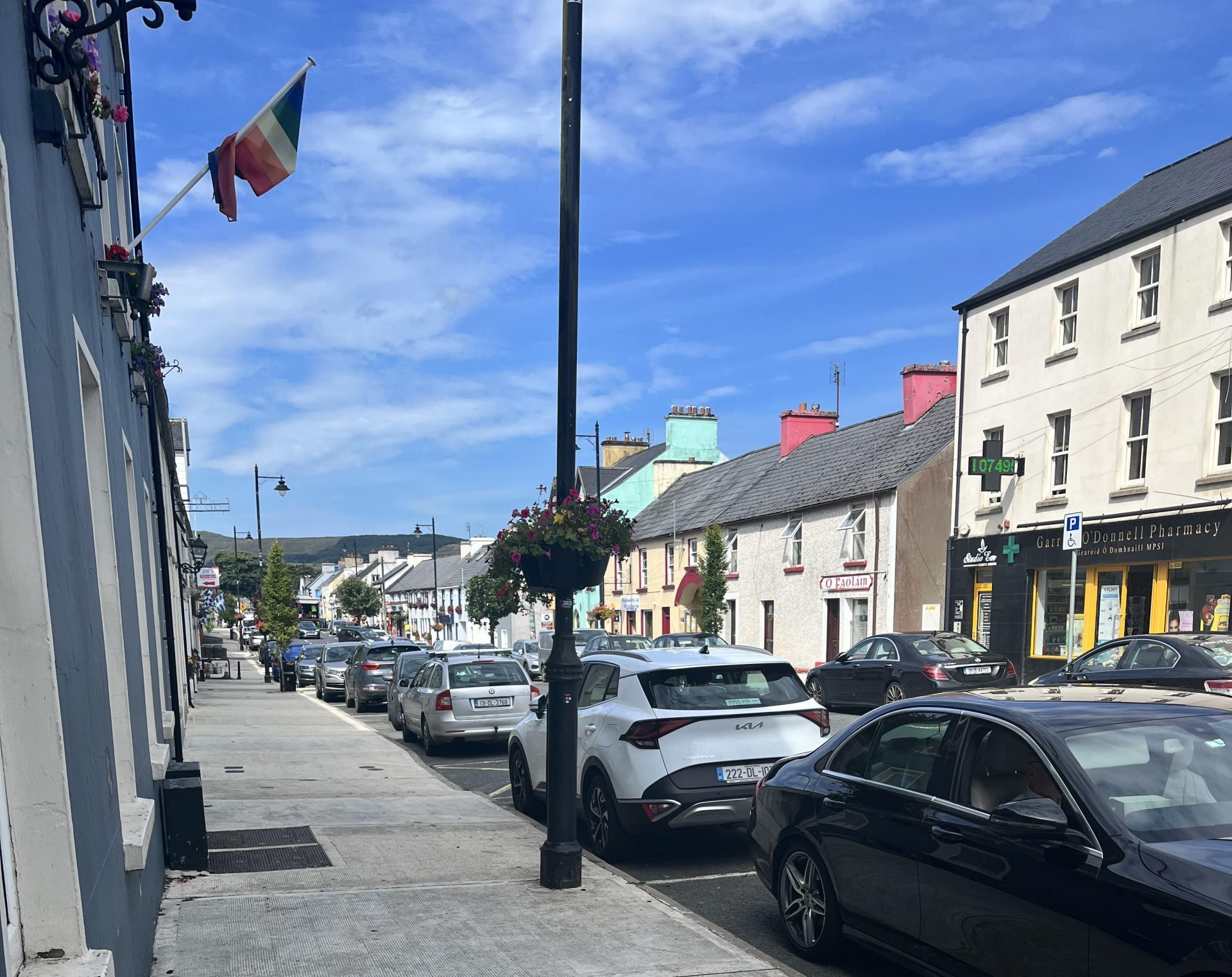
12:21pm: Declan Kelleher, former Irish Ambassador to China says challenges between China and the EU are becoming clearer.
However, he says the Ukraine war has had a significant impact on the relationship between China and the EU:
During his contribution to this morning’s conference, the former Ambassador also said that the European Union needs to focus more on the global order.
11:42am: Mr Bo has warned that the prospect of war between China and Taiwan would be really consequential and would be more serious than the war in Ukraine.
11:30am: Zhou Bo told the MacGill Summer School that when he wrote an article in the Financial Times telling Putin, ‘don’t use nuclear weapons Mr President’ that he did not know how his own Government would react to his statement
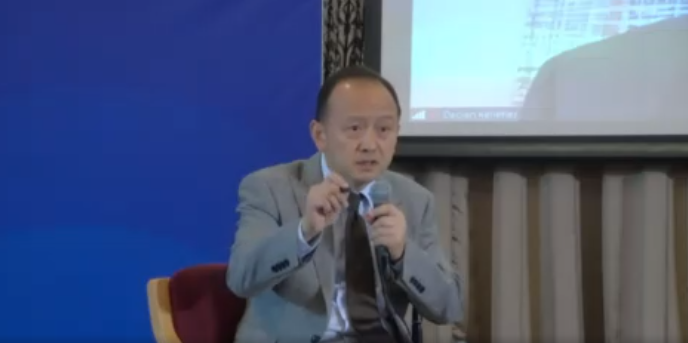
He says if he has contributed in anyway towards Putin’s decision not to use nuclear weapons then his whole life is worthwhile.
Is China really on Russia’s side? Zhou says ‘no’.
With all that being said, later, in response to a question from Olena Tregub, fellow at Atlantic Council and Executive General of Nako, Ukrainian Independent Anti-Corruption Commission on how Ukraine could work with China to bring about an end to the war Mr Bo said only when both sides get ‘tired’ of fighting:
11:25am: ‘The only thing I know about Ireland is Donegal Tweed’ – retired Colonel Zhou Bo says his only knowledge of Ireland dates back to the purchase of a suit in London:
11:18am: Professor Andrew Cottey says China has been able to convert its rise in economic power into political and military power. In more recent years, he says there has been a worsening of relations between China, America and the wider West. Some Professor Cottey says have described it as a new Cold War.
11:14am: Zhou Bo, Senior Fellow of Centre for International Security & Strategy, Tsinghua University, China and Professor Andrew Cottey, EU Jean Monnet Chair in European Political Integration, UCC take to the stage.
Declan Kelleher, former Irish Ambassador to China joins the discussion live from France.
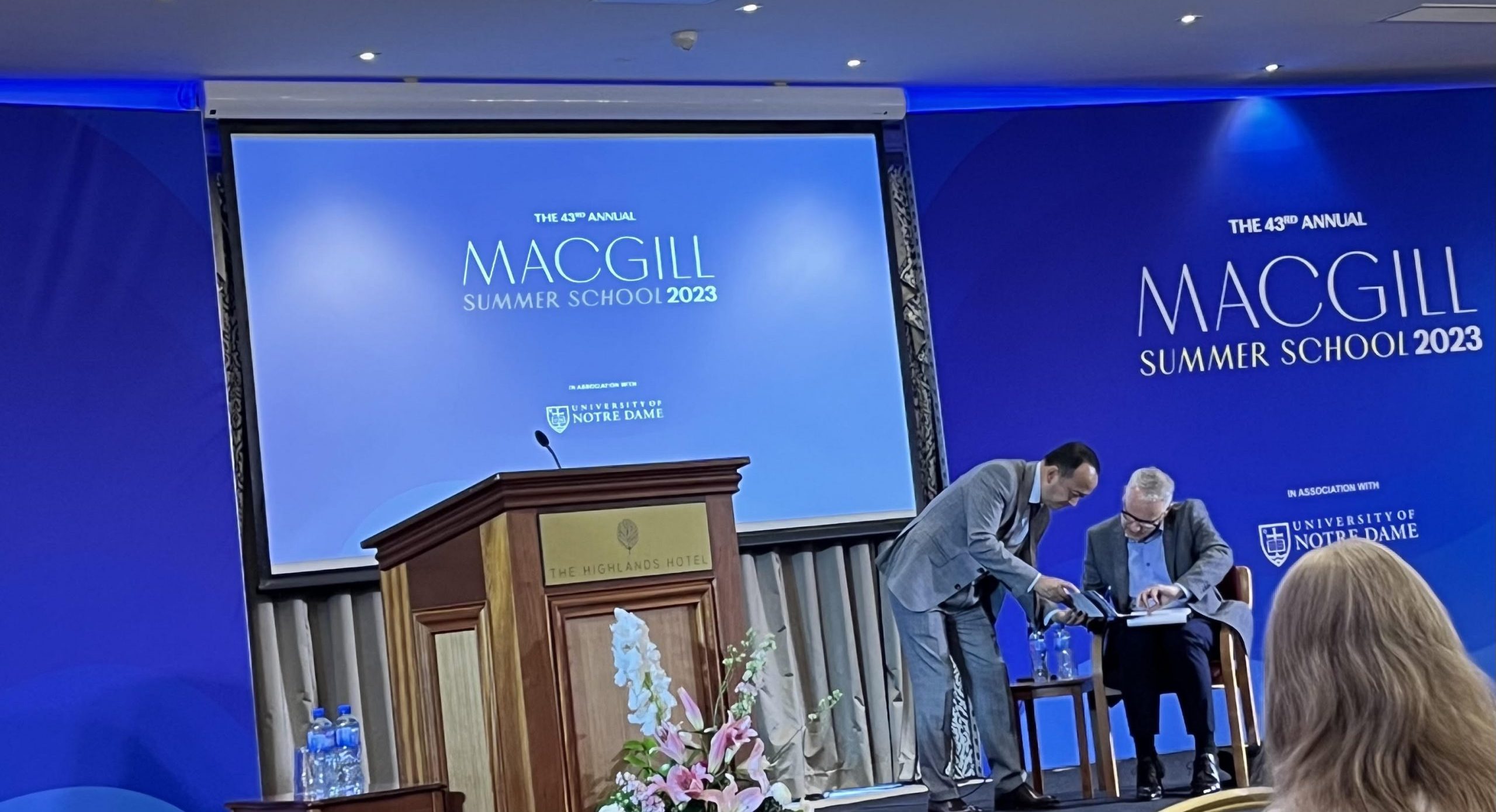
11:03am: Dr Joe Mullholland, Director of MacGill Summer School opens day two events
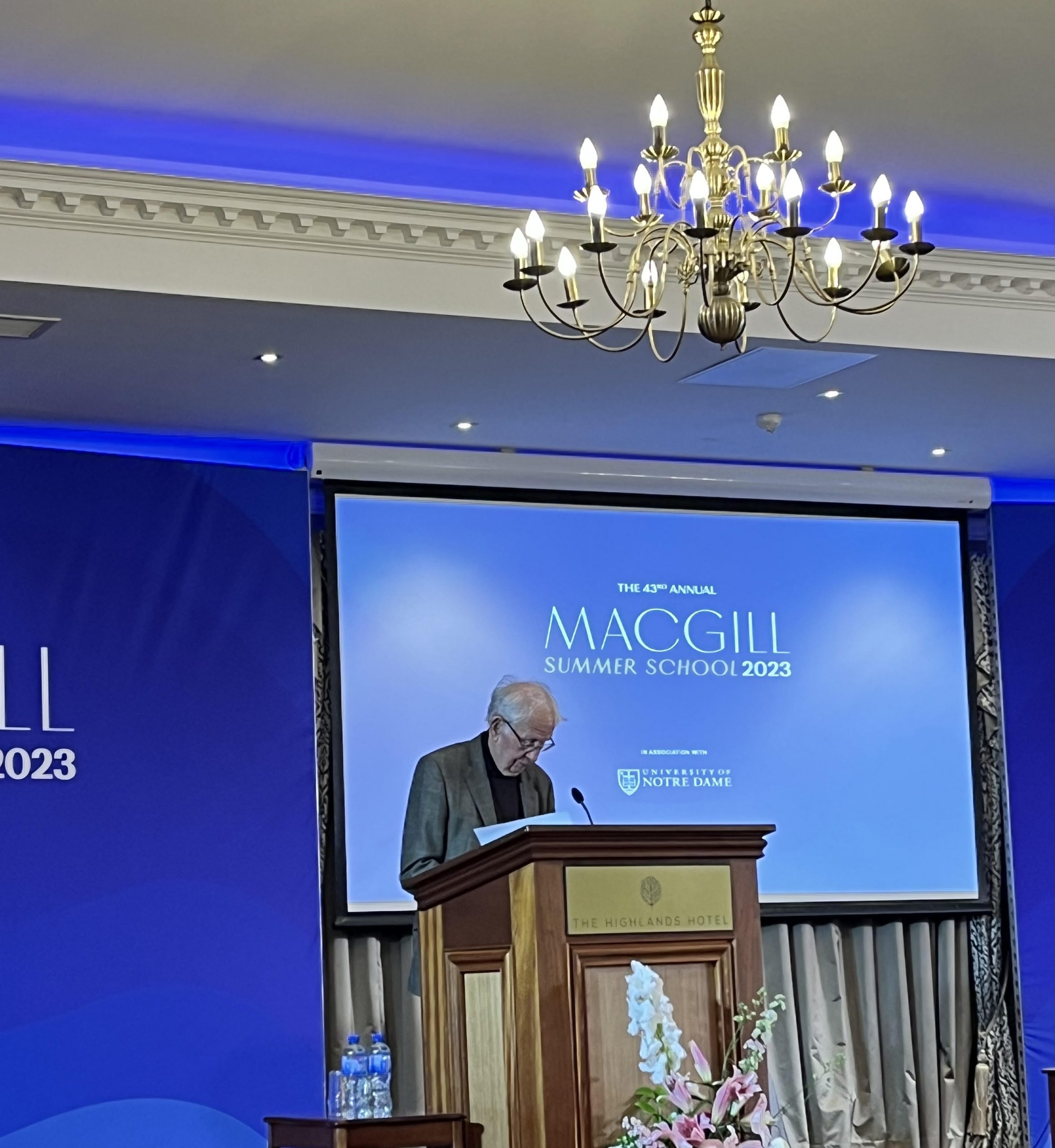
He paid tribute to broadcaster Michael Parkinson who has passed away at the age of 88.
Thursday, August 17th – 10:03am: Day two of MacGill Summer School will commence at 11am this morning
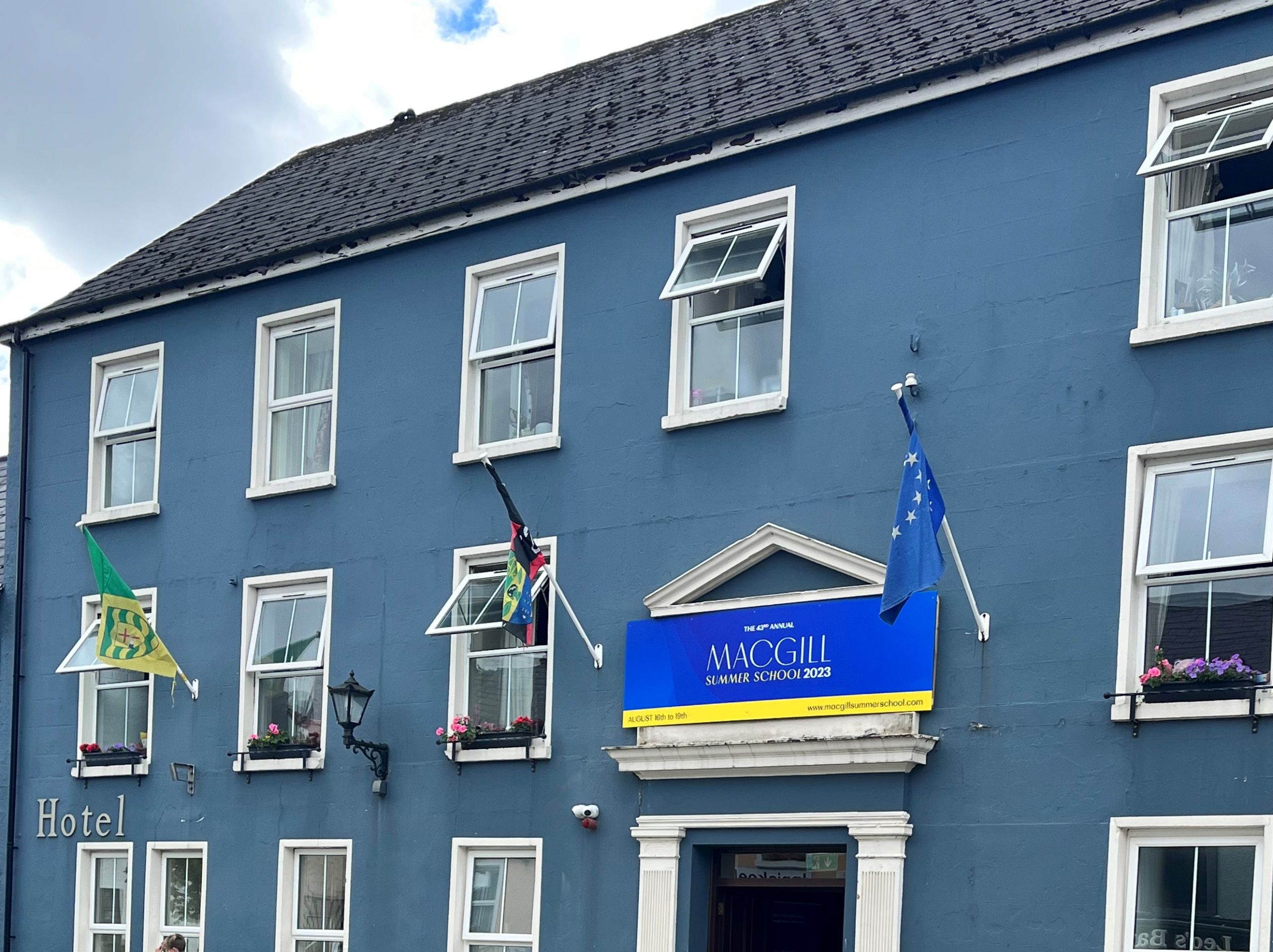
How to restore peace, harmony and stability to a dangerously distressed planet and the role of China kicks off discussions today on the second day of the MacGill Summer School.
Today’s opening conversation will centre around the emergence of China as a powerful global power vying for technological leadership and diplomatic influence with the United States and the ‘West’ and how it poses considerable dilemmas for most nations, particularly in light of its apparent tolerance of Putin’s Russia.
Later, EU Commissioner Mairead McGuinness will be a panelist in discussing the challenges of the European Union and how it is an increasingly difficult and complex mission to be fulfilled.
A GAA exhibition match will take place this evening at 6pm between Naomh Conail and Notre Dame.
The second day of the MacGill Summer School will conclude with the 23rd annual John Hume Lecture delivered by US Congressman, Brendan Boyle.
10:20pm: Day one of MacGill Summer School draws to a close
9:41pm: When asked about the fear of nuclear escalation in the Ukrainian war and what the response of Ukrainian policy makers is, Olena Tregub says there are huge discrepancies but they are not deterred by nuclear weapons.
She believes that if there was further analysation of nuclear weapons, people may not be as afraid.
9:30pm: Jade McGlynn, a scholar, author and Research Fellow at Kings College London, specialising in Russia and Ukraine and policy advisor to the British Labour party recently travelled to Kyiv and told the MacGill Summer School that what distressed her most upon her return was that the gravity of the situation on the ground was not reflected in discussions on what support could be given by the English Government.
She says the Western response has been totally inadequate.
9:20pm: Dr Sergei Medvedev of Charles University of Prague, a Russian cultural historian, journalist and broadcaster has labelled those responsible for the Ukrainian war, a ‘criminal gang’.
Now living in the European Union, Dr Medvedev says most Russians are ‘not willing to notice the war’ and that they have no opinion or vision for the end of it.
He believes the end of the war will not be decided by a defeat in Ukraine because Putin has naturalised, normalised and glorified the war in Russia.
It’s been claimed that Putin believes the Ukrainian war is World War Three, that belief is held by Dr Medvedev who using the analogy of the end of the Second World War, says Russia is a global problem and to bring about an end to the war the Russian army must be dismembered, nuclear weapons must be taken away from Russia, and there must be deimperialisation and decolonisation of the country.
He says unless Russia is brought under control the security is a global threat:
8:56pm: Olena Tregub, fellow at Atlantic Council and Executive General of Nako, Ukrainian Independent Anti-Corruption Commission travelled from Ukraine to Glenties and has told the MacGill Summer School that people in Ukraine believe the war will end with their victory.
She says victory for Ukraine is not just regaining their territory but it is being admitted to the West and having security as a member of NATO so that people can live their lives without threats from Russia.
Ms Tregub however, says the ending of the Ukrainian war depends very much on assistance from other countries.
8:53pm: ‘How and when the war in Ukraine will end?’ – a panel discussion
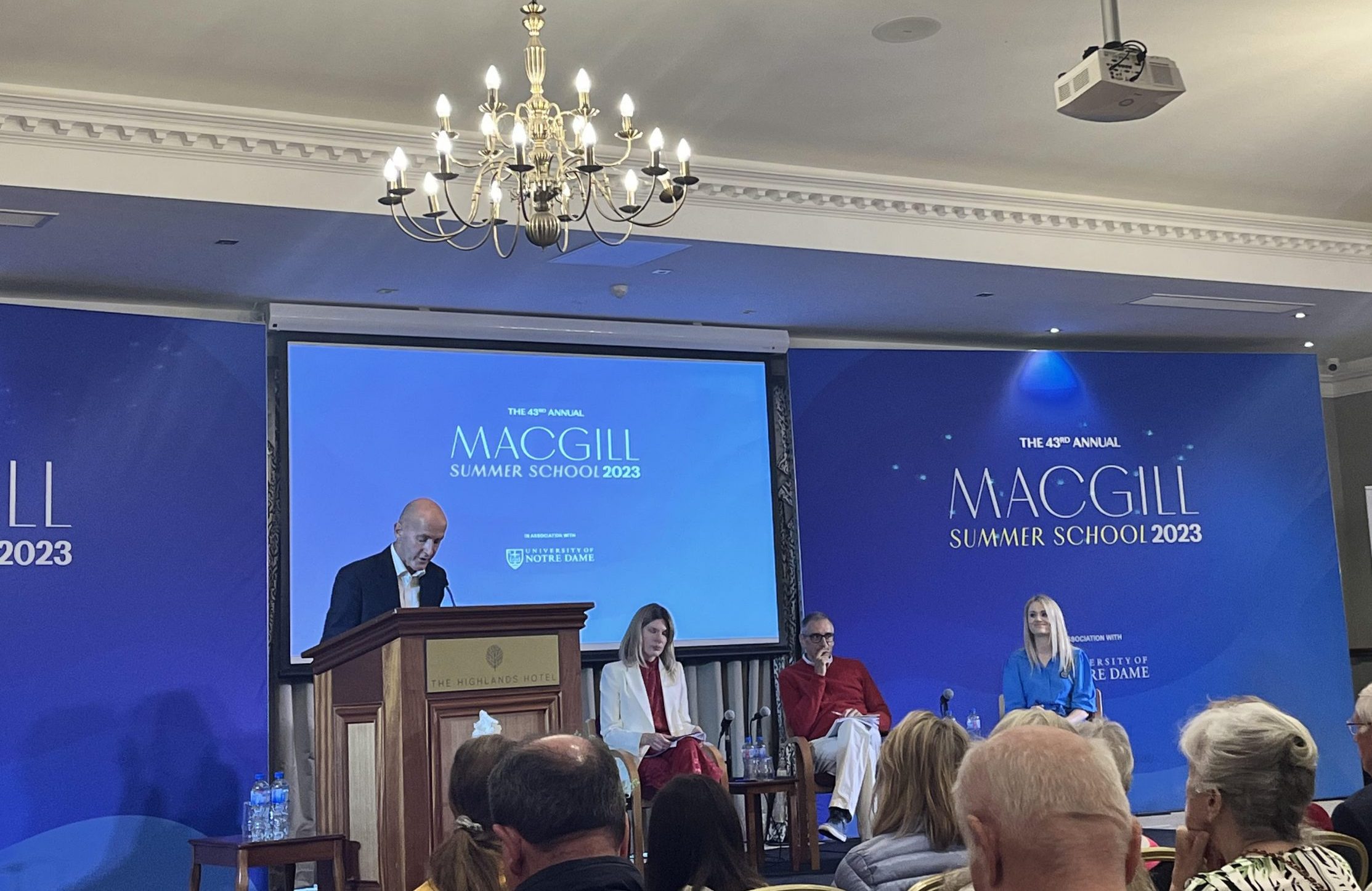
6:48pm: Ukrainian Ambassador to Ireland Interview:
Ukrainian Ambassador to Ireland warns MacGill Summer School ‘world cannot stay silent’
6:35pm: A number of Ukrainian children and parents have taken to the stage at MacGill Summer School to speak of their experience in Donegal.
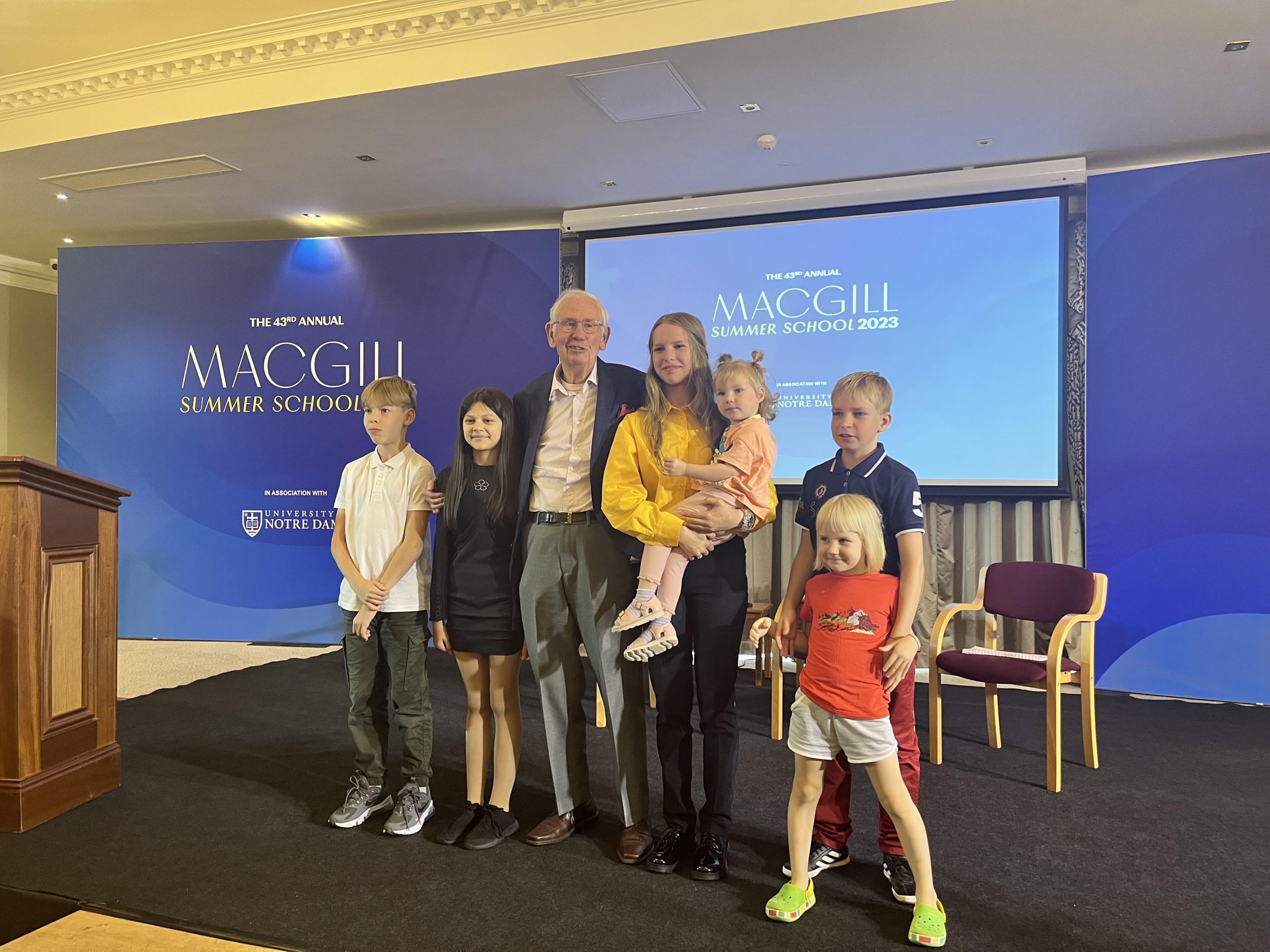
The sentiment was similar among them all, while they are happy in Donegal, they long for the time when they can return home.
Andrew says everything is Ireland is different when compared to his life back in Ukraine.
He says he witnessed one of the darkest days in Ukraine:
Leah, who has been residing in Donegal for a year aspires to one day become an Irish citizen:
6:25pm: In a heart-warming moment, Ukrainian children took to the stage at MacGill Summer School to recite the Ukrainian national anthem followed by the Irish national anthem
5:26pm: Davyd Arakhamia believes Ukraine can overcome the war with its superiority in technology in comparison to Russia. He says technology in the form of drone surveillance has helped save the lives of many soldiers.
4:58pm: Davyd in his role as an activist, created a group to stand guard around the city of Donbas to fend off Russian military. He recruited men with legalised weapons and trained them to defend the city.
4:52pm: MacGill Summer Schools hears from Davyd Arakhamia, a politician and entrepreneur who is a member of the Servant of the People political party
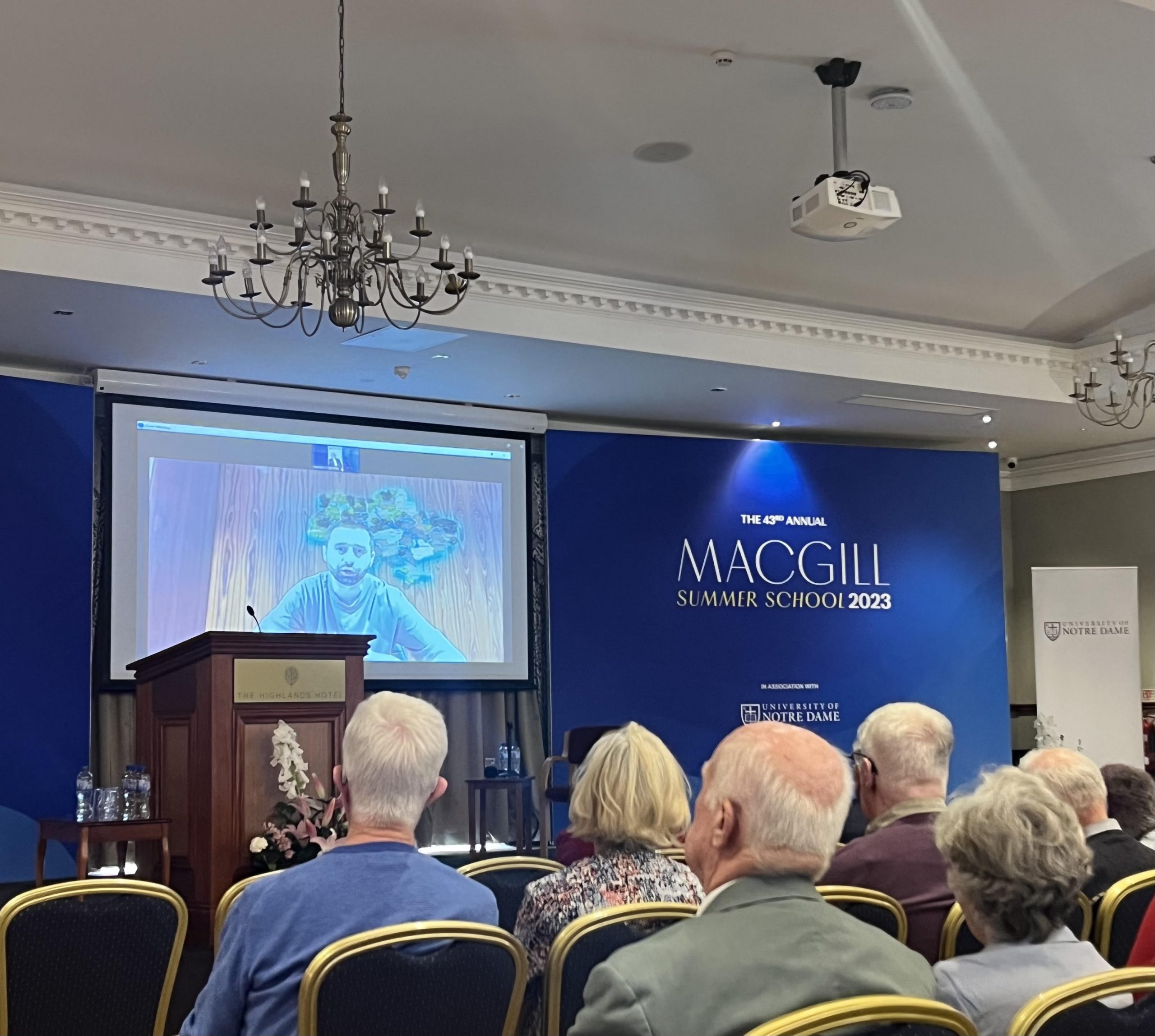
Davyd was elected to Verkhovia Rada in 2019 and was part of a close circle of advisors who remained in the Capital, Kyiv with President Volodymyr Zelenskyy at the outset of the Ukrainian war.
In February last year he was part of a negotiating team sent to the Ukraine-Belarus border for talks on a potential ceasefire.
4:42pm: Pat Cox says questions have been raised over whether the Russian state and its President Vladimir Putin are as strong as was initially perceived.
However, he says there are indications that Russia is now serious about a longer war by investing in the military economy and by producing military hardware.
In conclusion, the former European Parliament President says he expects counter offences to continue in Ukraine and that “2024 may be the conclusion year or it may not but it is likely to be more conclusive than 2023.”
4:07pm: Pat Cox, former President of the European Parliament recounts his visit to Ukraine in the midst of the war
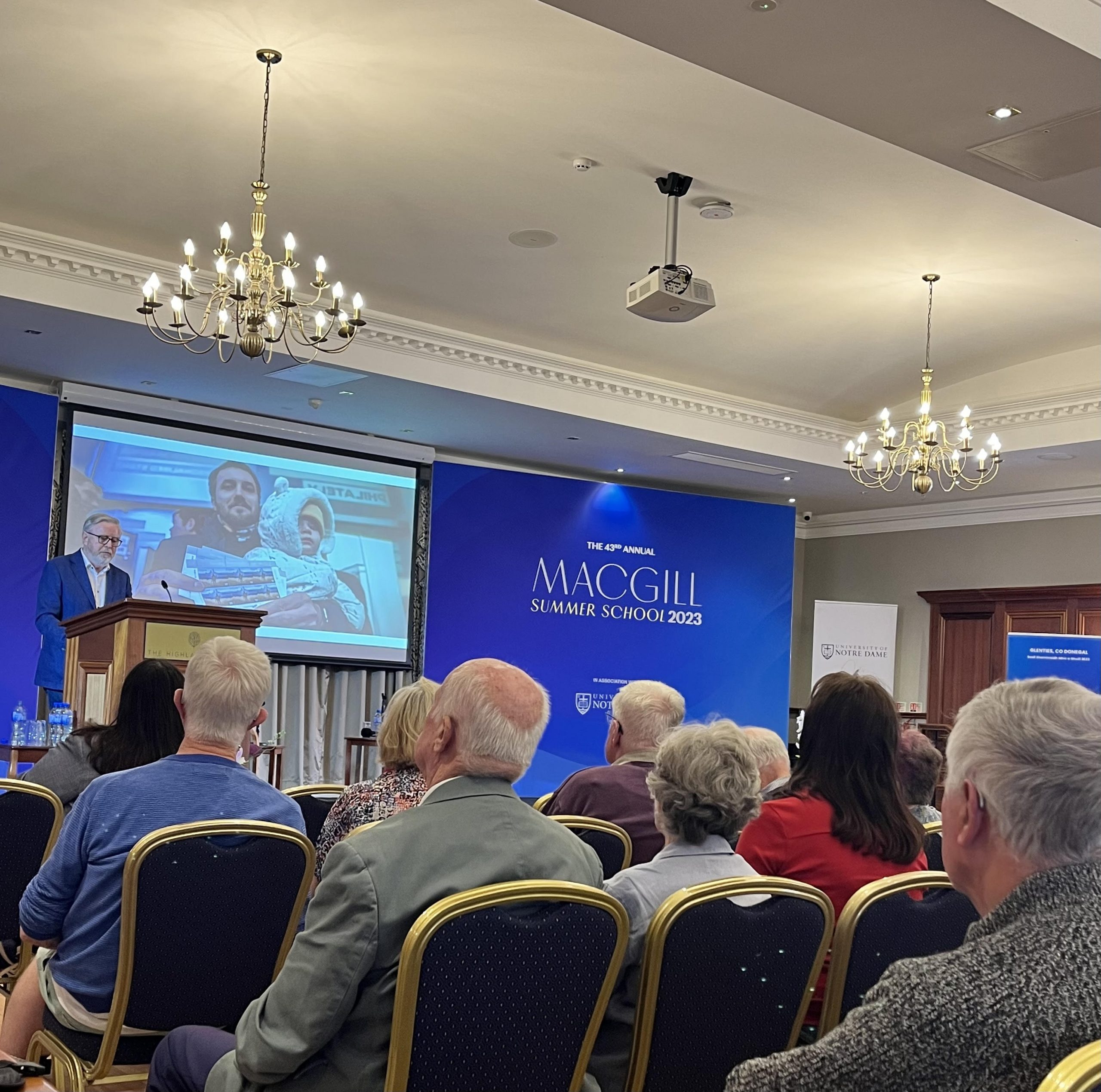
3:47pm: The Ukrainian Ambassador to Ireland, Larysa Garasko concluded her speech at the MacGill Summer School by saying; “We have to be aware that this war is not only a war against Ukraine, it is a war against democracy, this war is against Europe, this war is against democratic values and we have to be united more than ever. Please support Ukraine. We are paying the highest price, the price of human lives.”
3:30pm: Larysa Garasko, Ambassador of Ukraine to Ireland begins opening statement
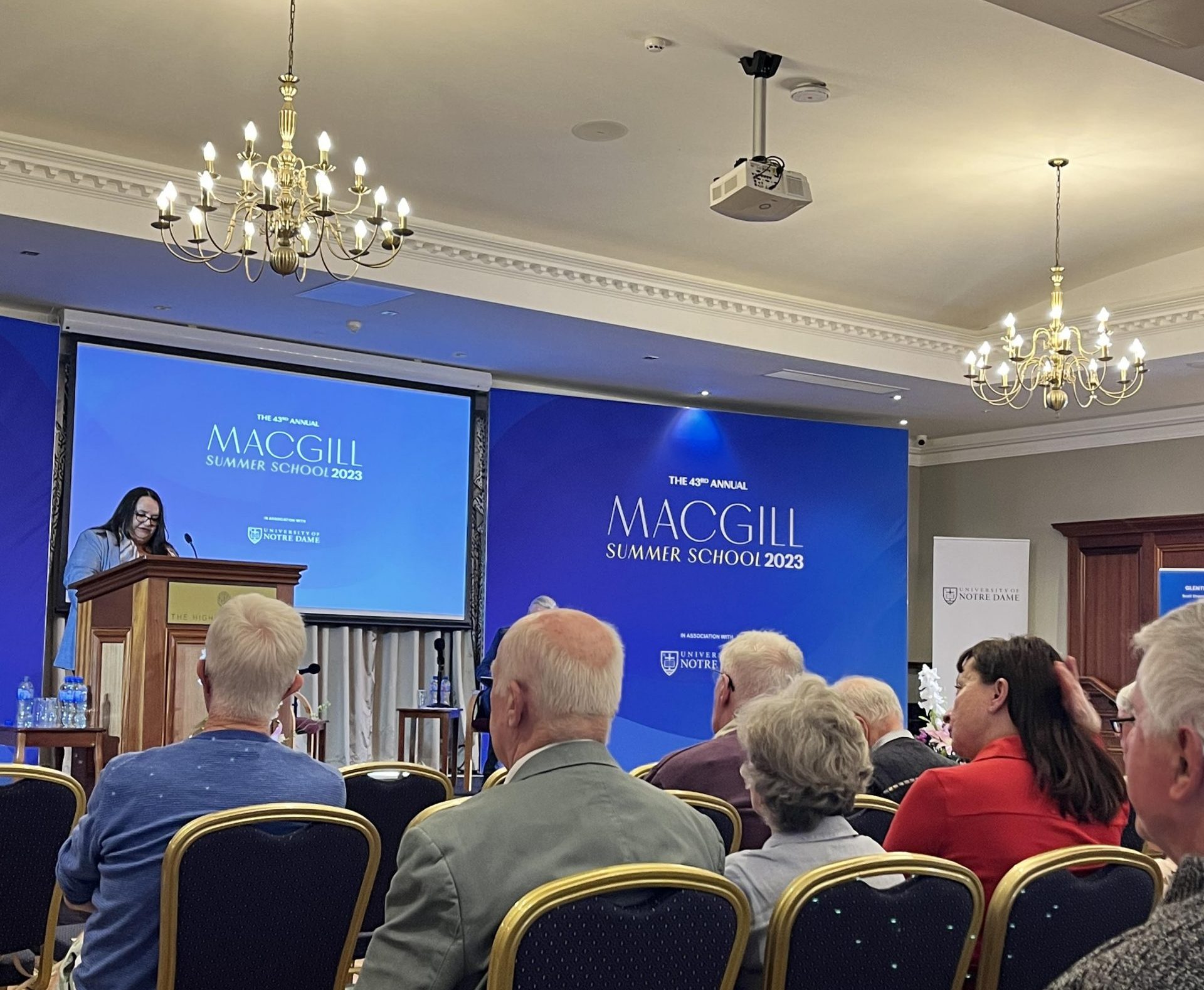
Larysa Garasko, Ambassador of Ukraine to Ireland in her opening statement says that almost a year and a half on from the full invasion of Ukraine by Russia that the war would have been over.
She outlines how Russia first invaded Ukraine in 2015 and since its full invasion, more than 6 million people have fled the country and sparked Europe’s largest refugee crisis since the second World War.
Ms Garasko says; “We are really grateful to Ireland and the Irish people for hosting our Ukrainian people.”
She says; “We want peace more than any other country does.”
The Ambassador believes that Ukrainian President, Volodymyr Zelensky’s formula to restore peace is realistic.
3:18pm: The annual MacGill Summer School has officially opened
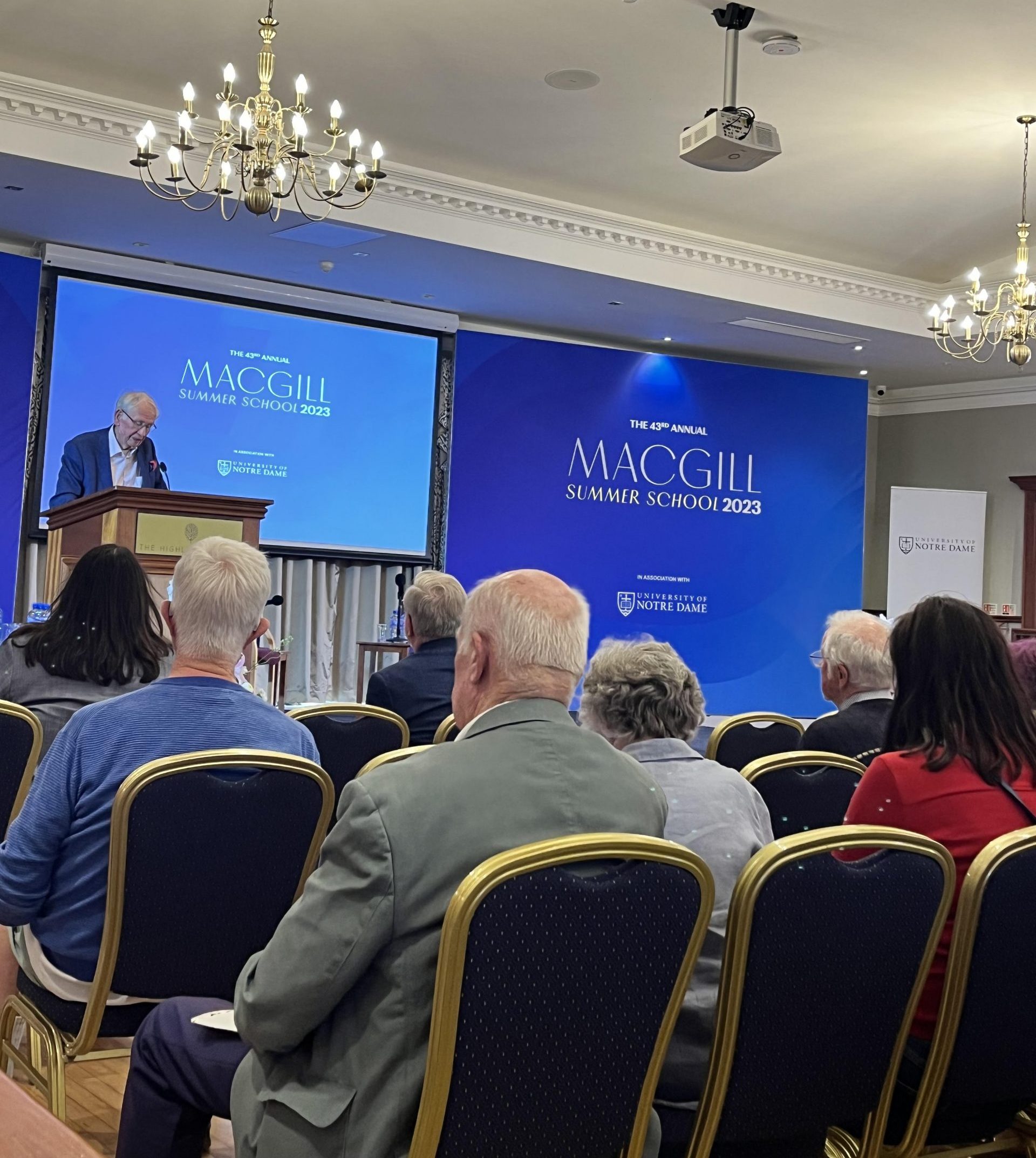
In opening the event, Dr Joe Mullholland said “the tragedy of Ukraine and its people has brought home to us so very forcibly that no country is an island and we must reflect that.That will be evident throughout the week and never more evident than this afternoon when we return to the plight of the wonderful people of Ukraine and particularly those who share our daily lives.”
Wednesday, August 16th – 1:48pm: The stage is set for the 43rd MacGill Summer School in association with University of Notre Dame at the Highlands Hotel, Glenties
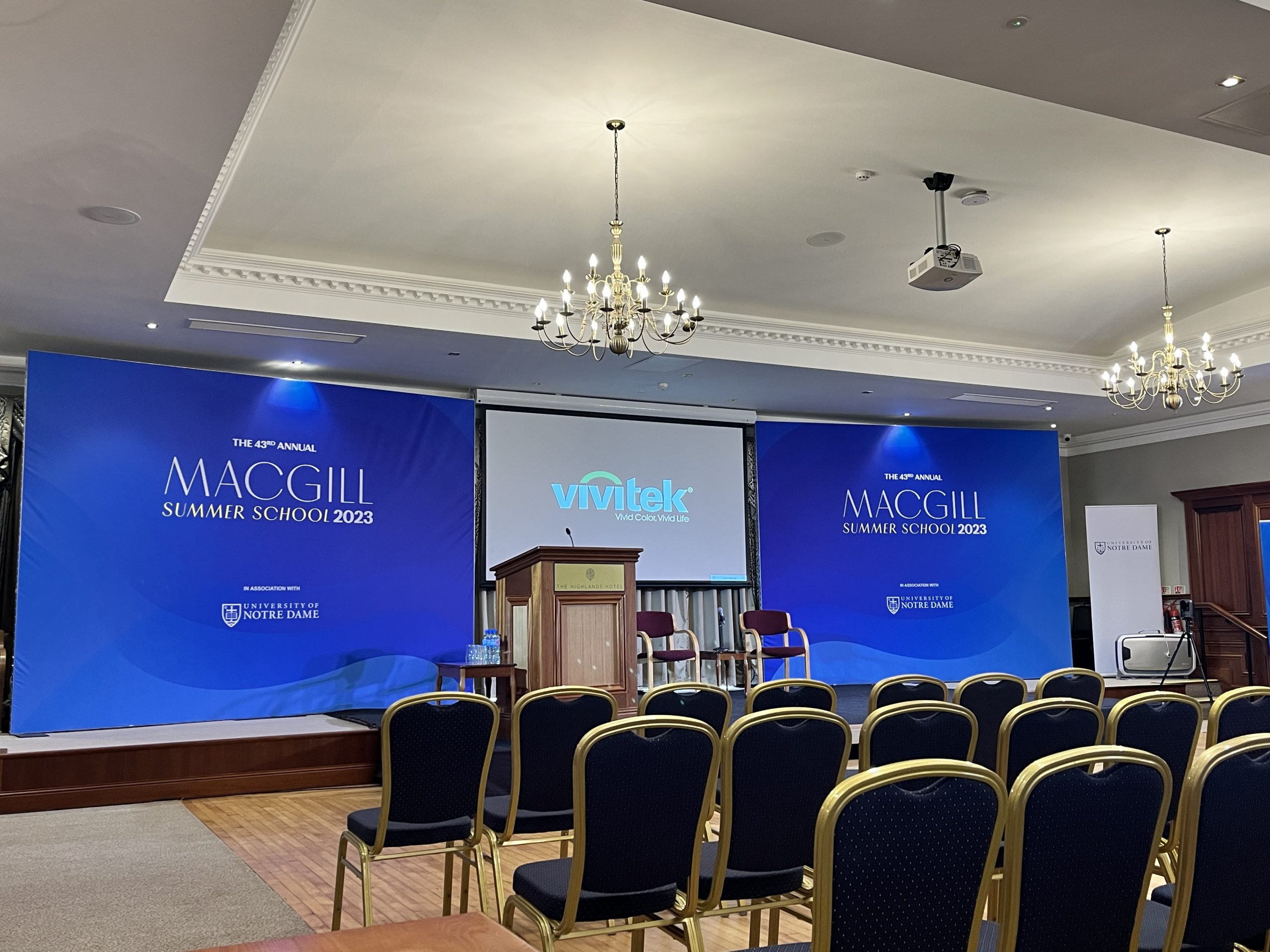
The official opening will take place at 3pm followed by a discussion between Larysa Gerasko, Ambassador of Ukraine to Ireland and Pat Cox, former President of the European Parliament.
Later, David Arakhamia, politician, entrepreneur and member of the Servant of the People political party will be live from Ukraine.
There will be a display of music and culture from Ukraine this evening while a discussion on ‘How and when will the war in Ukraine end?’ will conclude with Dr Sergei Medvedev, Charles University of Prague, Olena Tregub, Fellow at Atlantic Council & Sec General of Nako, Ukrainian Independent Anti-Corruption Commission, Dr. Jade McGlynn, Research Fellow Kings College London and author of ‘Russia’s War’ part of the panel.
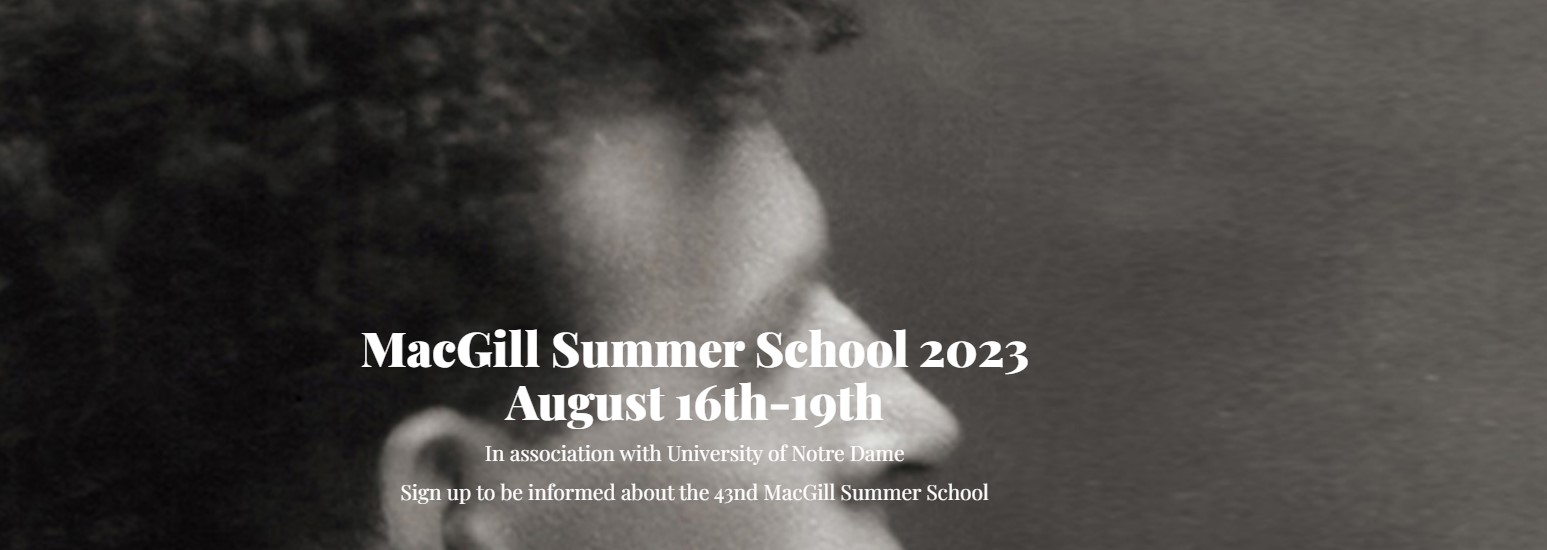
‘A New Global Order: Precarious & Dangerous?’ is the theme of the 43rd MacGill Summer School.
It was founded in 1981 in Glenties to celebrate the memory of local writer, Patrick MacGill who, in the early 20th century wrote on social conditions in Donegal, the plight of migrant workers in Britain and the horrors of the Great War in which he fought as a soldier of the London Irish Rifles.
Government ministers, parliamentarians, heads of industry, trade union leaders, economists, sociologists and a range of public representatives from the North, South and beyond will descend on the Highlands Hotel in Glenties over the coming days where a range of topics will be discussed including the Ukrainian war, the role of China, how the EU is fulfilling its mission, the Irish economy, the future of Russia, Ireland’s future, the plant and artificial intelligence.
Other events taking place are the 23rd Annual Hume Lecture which will be delivered virtually by US Congressman Brendan Boyle, a display of music and culture from Ukraine, a GAA Exhibition match between Naomh Conail and Notre Dame, a conversation with Senator Michael McDowell and a celebration of poet Seamus Heaney on the tenth anniversary of his passing.
Among those in attendance this year are the Ambassador of Ukraine to Ireland, Larysa Gerasko, EU Commissioner, Mairead McGuinness, Senior retired Colonel Zhou Bo, Senior Fellow of CISS, Tsinghua University, China, Charlie McConalogue, Minister for Agriculture, Food and the Marine, Sinn Fein Deputy Rose Conway Walsh, Emma Little-Pengelly, DUP MLA and Prof Barry O’Sullivan, Professor of Artificial Intelligence UCC.
